#i do love time loops narratives that explore how a person is confronted with their life and their choices
Text
hopeless time loop. the way out isn’t to save everyone. the way out isn’t to save even one person. the way out isn’t to change anything. the way out is accepting how it happened the first time is how it always will be. that’s how you acted, that’s how they acted, that’s how you would have acted every time if you weren’t given the curse of hindsight. the way out is accepting you can’t fix the past; you can only forgive yourself for it.
#there's this game i love called little hope that plays with these ideas (though not with a time loop)#i do love time loops narratives that explore how a person is confronted with their life and their choices#when forced to live the same day over and over again#and i LOVE time loops that try to reverse mistakes made and lives lost#but to see a character put themselves through loops upon loops upon loops#trying to rectify past mistakes (especially in the case where people died) only to be confronted with the reality it isn't working#and even in a loop where they save everyone the loop just resets#because the universe is essentially saying 'no that isn't how it happened and you know that's not how it happened'#it compels me!#i feel similarly about time travel where time 'fights back'#like this idea that there is a central timeline that time does not like being diverted from#so it will try to course correct itself#you save lincoln from an assassination only for him to die in a train crash#it's a cool way to confront the idea of fate#anyway all tragedies are hopeless time loops thank you for coming to my ted talk#a shout into the void#1k
5K notes
·
View notes
Text
Devlog: Single Choice Jam [post mortem]
It's strange to me that a little over a month ago this game did not exist--not even as an idea--and now it's this entire thing. And I love it.
This post will contain some minor spoilers for Another Round, the game I made for the Single Choice Game Jam. If you haven't played the game yet, you can play it here!
It's hard to describe the shape of joy I feel right now. My first attempt at making an IF game did not end successfully. I liked the story I came up with but got very stuck on (what I considered) insufficient technical skills. And, thusly discouraged, I did not make the game. Over the year since my first attempt, I've slowly built skills, knowledge and experience--the creative person's holy trinity. Then along comes this post about a game jam where you can only give the player a single choice and I'm like, "Huh, that would be technically accessible to me but how do you make a compelling story within that imitation? Interesting premise but I'll skip this one."
I kept scrolling, but the idea noodled around my brain. What if the choices you couldn't make were as much a part of the narrative as the one you could? What if it was a loop game about growing an learning from your mistakes? What if there were lesbians?
And, honestly, it spiraled from there. I experienced more story creep than scope creep, oddly. Originally, the idea was that each round would be about 2k words and the whole game around 15k. The whole story was only going to be the final confrontation between Maddie and Agnes. The character Seven didn't exist--and that alone makes the 25k+ wordcount worth it. I love Seven. And as much as I hate when authors claim "the story wrote itself" it kind of did in this case. Much of what's in the final version was first draft material.
I'm not done with the game yet. The writing in some places isn't as elegant as I'd like. I want to add a secret ending and some other storytelling/conditional elements. And, despite about five rounds of copy editing from myself and my Dearest Friend, I've spotted several typos in the published game. Sigh.
Despite all that! I am proud of what I've accomplished. I had no intention of playing in a game jam this year but I am very glad I did. I love the game I made. Many aspects of the story are deeply personal and the telling of it brought a bit of catharsis to my heart.
Thank you to those that've played! I hope you enjoyed it. I'm spending time this weekend playing the jam games and helloooooo Baldur's Gate. But! I also had an idea--post-jam, natch--that would be an interesting, smaller scale exploration of the rules of the single choice jam that would also help me practice some of my Twine skills. So, that might be a forthcoming thing.
Good luck out there, folks! Be kind to each other
9 notes
·
View notes
Text
ok i like cliche’s and am ignoring writers block. here’s a list of scifi narrative cliches that i think would be fun to explore in the apex fancreationverse- i got a little rambly but here we are (no ship suggestions or anything of the like, just plot pitches)
(this is just things that jump to mind as ‘logical’, but like.... who cares? It’s a piece of fiction first and foremost, but it’s also set in a future time where science has done incredible and almost magical shit. do whatever you want if you like an idea off here(but please ping me i wanna see👁👁))
Bodyswapping - makes the most sense between the simulacra and if we push it, mrvns. Ash / Revenant / Pathfinder bodyswap? I think Path running around in Revenant’s body could be fucking hilarious. But imagine Rev with Ash’s giant ass knife.
Time loop - ok ive started a fic for this but - It makes the most sense if you use a digital gamespace playing on loop for a technological reason. Maybe a system error or something, could be group wide or specific to some people! In TV its the easiest sort of Sci Fi Bottle Episode to justify imo, so it works GREAT here. A classic escape room in the most techy of spaces really forces someone or a group of someones to come together or break apart.
Lie Detector - A heavily character driven plot where two or more people are put in a (usually) life or death situation relying on Someone to tell the truth of a situation. example below bc i think it helps it make sense why this is on the list
Stargate SG1 did this in an episode where to confirm two character’s story of an event, they both had to undergo an alien lie detector. But because the two characters were both in MEGA denial about being in love with one another, they continued to show as lying about the events until they confronted it and accepted that that was influencing why they made their choices.
The syndicate wanting to check people’s story of a an event, say the teleporting of Olympus or a rebellion against the syndicate would work well here.
Space Beach Episode - In classic sci fi, I think this would most often be getting stranded on an alien planet but I think it could work just as well as being stuck in the ring without a way out - if you take the games to be fully physical that could take hours to days depending on how long you assume a game lasts. . i’ve actually seen a couple fics like this and they’re all AMAZING.
Time Travel - you know it, you love it! Horizon is working on this bad boy, who is to say that she doesn’t get it working! A little too well in fact! Have you considered what would happen if you accidentally sent some or all of the legends lineup to the (19)90s? Or what if you sent them even further into the future?
Classic Miscommunication - This one is not Sci Fi based, but it still would work all the same. Who is to say with so many different language speaking legends we don’t get a little miscommunication? Might be tech related or it might not! Could work as a neat little oneshot or something longer depending.
Mind wipe - Self explanitory, somebody gets more or less reset. I think this could work really well with like a drama or angst heavy plot, though it may require some setup. Someone is rebelling against the syndicate either solo or in a group, and gets captured. Perhaps before every match the syndicate takes a brainscan or makes a copy of the legend. What if that captured soul got reset back to and old scan by some means? Re educated to be the perfect little lapdog? I think there’s potential there!
Doubling up - What’s a good story with simulacra and good future science without somebody ending up getting duplicated for some reason or another? It may be accidental! Whoops i just put this 1 to 1 brain scan of XYZ legend inside this mrvn. What’re they gonna do next? Or it might be intentional - no better way to be in two places at once for hyjinks than to be two persons at once!
ok thats all ive got rn but !!! hey. here they are. let me know if you like them or especially if you’re inspired by any of them!
#apex legends#apex#apex legends fanfic#i have several ideas for fics that i know i will likely never use#so i want to share the love a little . i hope that someone else is able to get something out of them#also if you want to know which specifically ive had ideas for that im not writing.... mind wipe my beloved#lie detector and doubling up as well.... theyre so nice
9 notes
·
View notes
Photo
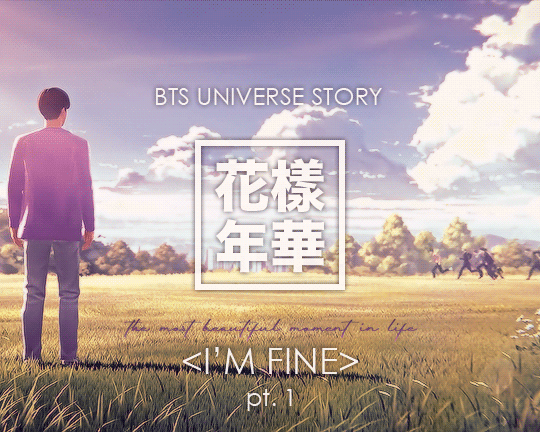
The Most Beautiful Moment in Life <I’M FINE>
BTS Universe Story Highlights, pt. 1 / 4
» pt. 2
Introduction
BTS Universe Story, a mobile game published by Netmarble, was released on September 24, 2020. While the majority of the app is essentially a sandbox and engine for users to create their own interactive stories, it also includes official and canon BU content. The first eight segments were introduced between the release date and December 2020, gathered under the title The Most Beautiful Moment in Life <I’M FINE>.
“I’m Fine” is half of the I’m Fine/Save Me ambigram introduced in the Love Yourself era. Notably, all of the BU content available in the game so far falls between events of the webtoon Save Me (also called HYYH0 in its logo) and The Notes 1—chronologically, that is, while bearing in mind that time resets to the morning of 11 April Year 22 whenever SeokJin fails to avert a tragedy among his six friends. I want to assure anyone who is unable to play the game that you are not missing any new, major plot beats from the overall BU narrative. Instead, the stories provide more insight into the motivations and consequences of SeokJin’s decisions in the earlier time loops, as well as more depth to individual characters and their circumstances.
The goal of this guide is to summarize each of the eight stories and highlight noteworthy details, especially if they are not yet present in other BU media. Within each story (which I often refer to as an arc, due to their character-focused nature), episodes must be played successively, but the stories themselves can be played in any order. I will present them over a series of posts in the order they are listed under the <I’M FINE> heading. The Prologue and NamJoon’s arc are free to play; the rest are paid content. Please note that due to the app’s Terms & Conditions, I will not include in-game footage here. The images in this guide are sourced from the official trailers/videos and the live action MVs as appropriate.
Content warning: contains references to death, suicide, suicidal ideation, child abuse, domestic violence, blood, homicide, depression, trauma, PTSD
This guide contains major spoilers and includes references to other BU media
Do not repost, copy, or quote without permission
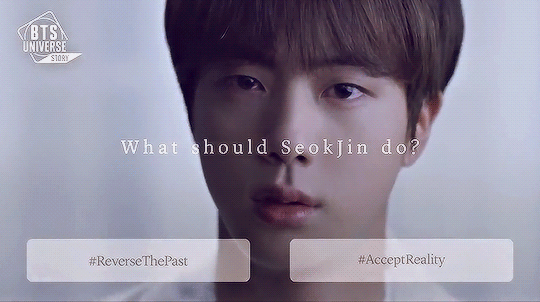
Game Mechanic
Before diving into the summaries, I would like to address the primary mechanic of the game: the user’s control of character choices at designated moments in the stories. It’s a primary marketing point that the player can influence the progression of the narrative, with a frequent in-app tip also declaring, “stories’ endings can vary depending on your choices.” The latter is not strictly true—and it cannot be true due to the structure of the game. Choices are presented within most (not all) episodes, but each episode is an isolated unit: episode 2 provides the same content regardless of what you choose in episode 1. Since the consequences of your decisions are not cumulative, each episode reaches the same ending, and each decision inevitably rejoins the “main” story path (effectively reducing the script size).
So what is the point of this mechanic? While the system is not nearly as complex as what major platform titles are capable of nowadays (I suspect due in large part to the story creation portion of the game), it does foster a sense of interaction with the narrative that isn’t present in static visual media like comics or film. The episodes with choices also have incentive for replay to discover the impact of changing a character’s dialogue or action. Sometimes the differences between the outcomes are inconsequential, but other times you unearth new details, interactions, or memories that are missing in the other path.
I say this partially in reaction to all of the comments and tweets I read for the game trailers and even Smeraldo Book twitter’s choose-your-own-adventure style teasers with The Notes 2 excerpts released last summer. Many users expressed excitement, through words or memes, about finally being able to give the boys the happy ending they deserved. I don’t fault anyone for wanting that happy ending—I wish for it, too. But no matter what the rather overzealous marketing has claimed, I don’t believe that the canon ending of BU is ever meant to be in the audience’s control. But I do feel that this mechanism fits the BU narrative. It echoes the “countless loops” SeokJin has experienced in an effort to save his friends, the choices he must make at every crossroad, and the butterfly effect those actions have on all of their lives. I think it is reasonable to interpret the simple branching paths in the game as alternatives SeokJin has explored across multiple loops in his struggle to find the “right” way forward. I’d love to hear if you have theories of your own!
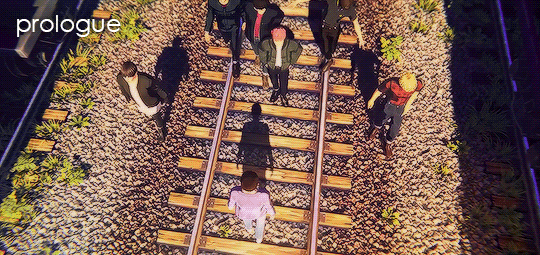
Prologue
The prologue is a brief episode introducing SeokJin’s repeated struggle and failure to save his friends. He wakes up yet again in his bed on 11 April Year 22, the beginning of the time loop. After reflecting on the tragedies that keep befalling the others, SeokJin realizes that he has only tried to fix the problems he can see. He wonders: “Have I tried to understand the root of my friends’ misfortunes? How much do I really know about my friends? Maybe I was never brave enough to confront their real scars and the worlds they’ve been living in. But I need to do it. Because it may be the key to saving them all.”
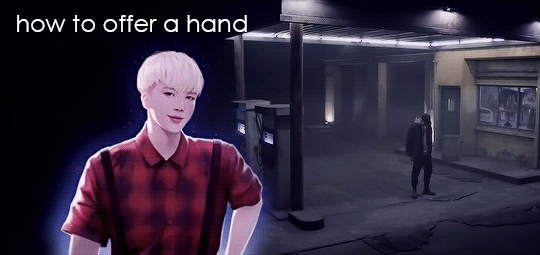
How to Offer a Hand
In this story, SeokJin attempts to prevent NamJoon’s arrest after he gets in a fight with a rude customer at Naeri Gas Station, his place of work. The first episode opens on the night of 11 April Year 22 with NamJoon curling his fists, glaring as crumpled bills lie untouched on the pavement. (The money looks similar to the shot from the I Need U MV.) SeokJin reaches for his shoulder, but NamJoon shrugs him off and strides away to punch the customer who deliberately dropped the bills for him to pick up. The gas station owner runs over at the customer’s furious shouts and orders NamJoon to apologize. He refuses, and police officers soon arrive and charge him with assault. No one listens to SeokJin’s protests that the customer started it first. The man sneers as NamJoon enters the police car. “Do you even have money for a settlement? Hey, you’re done for.” NamJoon is sentenced to prison again, and SeokJin hears glass shattering before the loop resets.
Rising from his bed on the morning of 11 April, SeokJin reflects on his failed efforts so far. He has hit the customer’s car, called for NamJoon in the middle of the incident, and stopped the fight himself, the latter of which caused his friends to avoid him later. The fight has even escalated; the details are unspecified, but the audience is provided an ominous shot of SeokJin speaking to a police officer alone at the scene. NamJoon is not the kind of person who would normally respond to that kind of provocation with his fists. SeokJin realizes that he cannot merely stop the fight but must discover and fix the true cause of it.
With this in mind, SeokJin heads to Naeri Gas Station during the day and tries to engage NamJoon. This is their first time meeting since they both returned to Songju, although SeokJin has experienced it in many loops already. “It’s been a while,” he greets (as he does at the end of the Blood Sweat & Tears Japanese version MV). Before SeokJin can dig deeper in their conversation, NamJoon is called away by his boss. SeokJin enters the small employee break room which serves as NamJoon’s living space when he’s not at the container, hoping to find some clues about his friend’s life. SeokJin locates something bundled in newspapers. If the player chooses to open it, he sees a strange shard of glass inside that may belong to a car or motorcycle headlight. He continues on, finding the book Cosmos by Carl Sagan and a notebook. SeokJin hesitates over the invasion of privacy but decides to read it since he needs all the information that he can gather. The journal entries detail NamJoon’s daily life since returning to Songju: his work at the gas station isn’t too bad despite the occasional rude customer; he purchased a book and hopes to get more in the future; he picked up a second job at a wedding hall to help catch up on bills; his brother NamHyeon got in trouble again, leading to more expenses; and his dad’s health has worsened, with hospital bills after an emergency surgery rising to levels that the family cannot afford. SeokJin knew that NamJoon was the de facto head of household due to his father’s illness but was unaware that it was to this degree. He feels sorry for NamJoon yet is also impressed by his maturity, for NamJoon never writes how difficult his situation is.
NamJoon arrives and asks what SeokJin is doing in the room. If the player chooses to answer “reading” instead of “just sitting there,” SeokJin privately observes that the conversation flows more easily when they talk about books. NamJoon says he must leave and declines when SeokJin offers to wait for him there. SeokJin knocks over a pile of books along with money and receipts as he stands. He thinks it is unusual that NamJoon picks up the books before the money. The books seem to be more than a hobby to NamJoon, holding special meaning. Walking to his car, SeokJin wonders if it is pride or determination not to falter that keeps NamJoon from journaling his grievances. He realizes that money is a constant source of frustration and misery to NamJoon, and that’s why he can’t stomach being insulted over the customer’s dropped money. SeokJin’s new plan is to prevent NamJoon from picking up the money. He also calls Palgok County Hospital and offers to pay the patient bill for NamJoon’s father. Anticipating that NamJoon will be angry if he finds out, SeokJin says the payer is Songho Foundation.
That night, SeokJin returns to the gas station with the excuse that he forgot to fill up earlier. The luxury car arrives with a honk, and NamJoon hurries over to assist. He shakes with anger when the customer drops the money on the ground. “Why aren’t you picking it up? You don’t want it? What’s with that look? Pretty arrogant for a part-timer, aren’t you?” goads the customer. SeokJin intervenes. Whether the player chooses to have him advise NamJoon not to pick it up or to order the customer to pick it up himself, the end result is the same. SeokJin asks the customer, “Why are you harassing a pitiful part-timer?” The customer drives away, and something about NamJoon seems off. His face is expressionless, not mad or humiliated. “SeokJin, you…” He stops. “Never mind. Thank you for your help.” The words sound difficult for him to speak.
SeokJin believes that he has saved NamJoon, although this ending feels sloppy. He continues on in the loop to rescue JungKook and later YoonGi, but uneasiness plagues him. Though he meant to help NamJoon with his actions, SeokJin wonders if he hurt him instead. On 5 May Year 22, he returns to the gas station and follows NamJoon when he leaves work early. NamJoon enters a bookstore, and SeokJin sneaks in after him to watch from afar. He overhears employees talking about NamJoon, worrying that he might dirty the pages of the book he’s perusing. NamJoon is too absorbed in the book to notice one of them calling for his attention. SeokJin recalls a memory from their school days when he found NamJoon reading alone in their classroom hideout: he asked why NamJoon read so diligently, and his friend explained that he found it comforting to empty his thoughts of everything else while focused on the book. In the present, SeokJin wonders how he forgot how much books mean to NamJoon. He sacrifices some of his food and transportation budget to afford them, but they enable him “to endure the weight of the world he’s forced to bear on his shoulders.” After realizing this, SeokJin wants to apologize for carelessly sympathizing with the reality that NamJoon has weathered alone.
The next episode is from NamJoon’s perspective, revealing his excitement over being able to purchase a book for the first time in two months. He wants to buy two but can only afford one. The employee at the register sighs and asks why he leafed through a book he wasn’t going to buy. NamJoon apologizes, and she mutters, “So dirty.” He notices his reflection, clothes worn and smelling of gasoline, and realizes she’s talking about him, not the book. He tries to shake off these depressing thoughts, but he is still not accustomed to this treatment despite experiencing it regularly at work. As NamJoon begins to exit the store, the security alarm goes off. The employees demand to check his bag despite his insistence that he didn’t steal anything. Their certainty of his theft angers him. NamJoon allows them to look through his bag, and they are suspicious of the like-new book in it which he brought from home. One begins to call the police until SeokJin appears, vouching for NamJoon by saying he saw everything. The employees accept that the alarm malfunctioned and excuse their suspicions as a mistake.
Outside, SeokJin asks NamJoon if he is all right. NamJoon is thankful but wonders how SeokJin materialized right when he needed him. “How’d you find me here?” he asks aloud. SeokJin explains that he happened to notice him while walking through the neighborhood. NamJoon wonders if it’s because they said goodbye on a weird note last time. He thanks him and turns to leave. SeokJin calls after him. “I’m sorry. I wanted to apologize. I didn’t mean to upset you that day at the gas station. It was a mistake to have called you pitiful. If my rash actions hurt you, I’m really sorry.” NamJoon accepts his apology, believing it to be sincere, and says that things would have turned out a lot worse if SeokJin had not intervened. Thunder rolls overhead, and NamJoon uses the impending rain as his excuse to depart. He declines SeokJin’s offer of a ride and runs home, feeling his friend’s eyes on him.
Before he can settle down to read at home, NamJoon receives a call from his cheerful mother. She thanks him for paying off the entire hospital bill. NamJoon is perplexed and asks what’s on the receipt, since he didn’t pay it. His mother wants to leave it be, but he insists that they investigate so they don’t get in trouble or sued. She reads that the Songho Foundation is credited as the payer. NamJoon calls the hospital, introducing himself as the guardian for Kim YoungMin, but they can’t transfer him to the administrative department at this time. Disappointed, he looks up the foundation’s website, unable to recall why it sounds familiar. He wonders why a scholarship foundation in the city would get involved with him. Spotting photos of a recent launch ceremony on the site, he recognizes a few people: Songju High School’s principal, the familiar-looking face of the foundation’s chairman, and SeokJin. First, NamJoon forces a laugh, and then it’s difficult for him to breathe. He thinks that SeokJin really had pitied him at that moment. The only thing keeping NamJoon going is the idea of getting through life on his own strength. Why does he have to live like this?
The last episode opens on 5 May back in SeokJin’s perspective. He is confident now that he has saved NamJoon, although it occurs to him that a better alternative may have been to simply pick up the money himself instead of stepping forward. (This decision is enacted in a later loop and depicted in the Euphoria MV.) While reflecting on what comes next to save his other friends, he receives a text from NamJoon. “What’s your account number? I’ll pay you back for the hospital bills. I don’t need your help. I’ll handle my concerns on my own.” Heart sinking, SeokJin wonders how he found out. With a sense of foreboding, he tries calling NamJoon, but no one answers. SeokJin texts him back, pretending that he doesn’t understand, and tells NamJoon to call him. SeokJin’s second attempt connects while he’s gathering his car keys to visit the container. “That’s enough. Just send the account number over text,” NamJoon instructs. SeokJin coaxes him to talk for a moment, and NamJoon asks flatly, “Are you going to apologize again?” SeokJin attempts to salvage the situation, but his friend turns cold when he insists that NamJoon is misunderstanding and that he just wanted to help. “So, why? Why are you helping me?! Yeah, you’re always a good person. You’ve done nothing wrong and I’m the one misunderstanding.” SeokJin apologizes again. NamJoon refuses his request to meet in person. “No, I thought maybe there was a reason for everything you did… But I guess I misconstrued it. I’ll pay you back, so I’d prefer if you stopped contacting me.” Long after the call ends, SeokJin stands holding his phone, feeling that the glass is going to break at any moment. He wants to believe that it’s not over, but hope is slipping through his fingertips.
The episode finishes in NamJoon’s perspective. On 8 May and 9 May, he accepts part-time delivery work and reflects on his three jobs. Whenever he thinks he’s at his breaking point, he focuses on his new goal of returning SeokJin’s money. On 10 May, NamJoon wakes up to his buzzing phone and is called in to work. On a scooter, he passes by a bus stop and notices graffiti. (This is the same bus stop, with matching graffiti, that appears in the Highlight Reel.) Mesmerized, he wonders if it’s TaeHyung’s. As soon as NamJoon looks up, the scooter’s brake fails, and he crashes. The shattered glass on the cold pavement reminds him of the headlight shard and the kid who looked like TaeHyung. (So the piece of glass SeokJin saw in April was really a memento NamJoon retrieved from the scene of the crash in the mountain town, where the delivery boy whom he privately called TaeHyung died. This event is described in NamJoon’s 17 December Year 21 entry in The Notes 1.) NamJoon’s vision grows blurry, and the distant sound of an ambulance doesn’t come any closer.
The arc concludes there, but it obviously marks another reset for SeokJin. It is interesting to note that in this failed loop, NamJoon suffers the same fate that he narrowly avoided in the snowy mountain town before returning to Songju.
Please stay tuned for the next Highlights post featuring JungKook and YoonGi!
#armiesnet#networkbangtan#bangtanarmynet#armysource#dailybangtan#bts universe#hyyh#bangtan universe#bts universe story#bts universe story highlights#seokjin#namjoon#namjin#bts theories
153 notes
·
View notes
Text
The Dos and Don’ts of Writing Smart Characters
Since I started this blog, one of the most common questions I’ve received has to do with the portrayal of intelligent characters. This is also one of the most difficult to answer -- excluding questions about characters with specialized knowledge sets, which are fairly easy to answer with source compilations. Most of the questions have to do with: how do you portray a smart character believably? How do you make the audience relate to them? Can I still make them likable? How do I avoid the pitfalls of popular media?
Well, I’m finally here to answer, utilizing examples from some of my favorite (and occasionally, not-so-favorite) media. Let’s jump in to the dos and don’ts of smart characters!
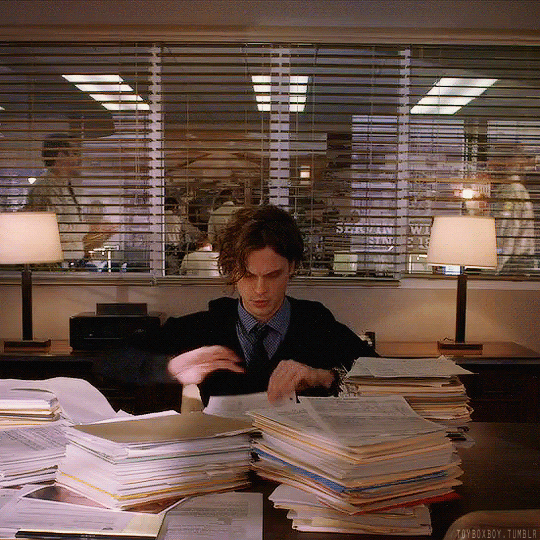
1. Do let the audience follow the character’s thought process.
As demonstrated by: Tommy Shelby from Peaky Blinders
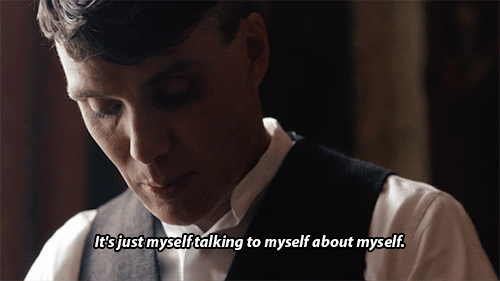
Albert Einstein allegedly once said, “If you can’t explain it to a five-year-old, you don’t truly understand it.” And the sentiment rings true: true genius doesn’t need to dazzle with big words and technobabble. Instead, it makes the complex appear simple.
The same rings true for brilliant characters. BBC’s Sherlock (more on that later) ceased to satisfy in its later seasons because it began to rely too heavily on visual glitz to avoid actually explaining its mysteries and how they were solved. Similarly, the biggest complaints with block buster franchises -- Star Wars, The Avengers, Game of Thrones -- is that they became obsessed with “subverting expectations” cleverly instead of leading the audiences to their most logical and satisfying conclusions.
Meanwhile, the smartest and most satisfying media dazzles not by staying over the audience’s head, but by illustrating how simplistic the solutions can be.
Let’s start with my boy Tommy Shelby, the charismatic, swaggering protagonist of the charismatic, swaggering crime drama Peaky Blinders. Using only his intelligence (and complete disregard for his own life/suicidal tendencies, but that’s not the point here), Tommy claws his way up from the near-bottom of the social ladder (an impoverished Romani in early 20th century Birmingham) to being a decorated war hero, to being the leader of a feared razor gang, to dominating the race track business, to becoming a business mogul, to becoming a member of parliament and trying to assassinate the leader of the fascist party. He’s also one of the paramount reasons why I’m bisexual.
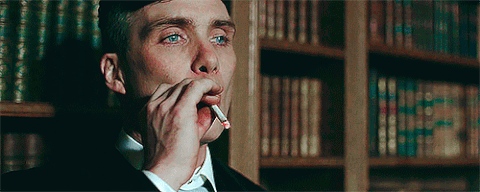
So how can such a drastic social climb be conveyed believably? Because Tommy -- as the viewpoint character -- is placed in seemingly inescapable situations, and then proceeds to demonstrate that the solutions to those situations have been there the whole time. I recently watched a brilliant video on how this is done, which can be viewed here.
Early in season one, for example, he responds to aggressive new methods by the police by organizing a mass-burning of paintings of the king, and uses the press this garners to publicly shame the methods of the chief inspector who’s been antagonizing him. In the next season, he talks his way into a deal by bluffing that he planted a grenade in his rival’s distillery. My personal favorite is in season four, when he responds to being outgunned by a larger, American gang by contacting their rival -- none other than an Alphonse Capone.
All of Tommy’s victories are satisfying, because they don’t come out of nowhere -- we have access to the same information he does, each victory is carefully foreshadowed, and we are reminded at every turn that failure is a very real possibility (more on that later.) So when he wins, we’re cheering with him.
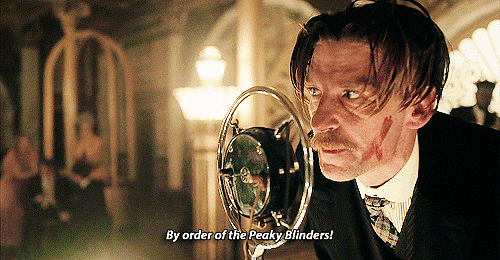
Other examples: Mark Watney from The Martian, who explains science in its most simplistic terms and with infectious enthusiasm. He would make every character on The Big Bang Theory cry.
Also, Miss Fisher from the AMAZING Miss Fisher’s Murder Mysteries. The dazzling, 1920s, female Sherlock Holmes of your dreams. I cannot recommend it enough.
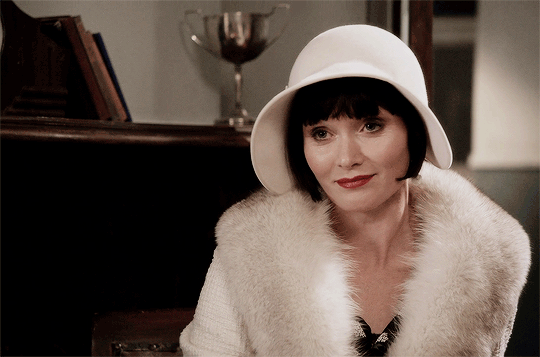
To apply this to your own writing: Remember you won’t dazzle anyone if you smack them in the face with a “brilliant” plot twist. They want to take a journey with your character, not be left in the dust.
Also, for everyone in my askbox concerned that they’re not smart enough to write intelligent characters, just remember how simple the problems confronting smart characters can be. Put them in a difficult situation, and provide them with a means of getting out. Then, just let them find it.
2. Don’t assume the audience is too stupid to keep up (or try to make them feel too stupid to keep up.)
As demonstrated by: Sherlock Holmes from BBC’s Sherlock.
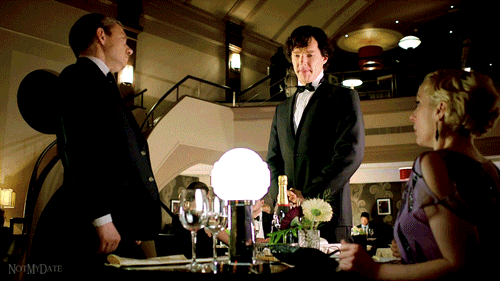
Say what you will: there were reasons why everyone was so captivated by this show during its first two seasons. It felt fresh. People had yet to become frustrated with the inescapable thirst for Benedict Cumberbatch. The writing was sharp, and the editing clever. And it wove a tantalizing web of mysteries that demanded solution. The problem was, there weren’t any.
The most frustrating for many was how Sherlock faked his death at the end of season two, after which devoted fans spent two years creating intricate theories on how he might have pulled this off. The creators responded by mocking this dedication in the opening episode of season three, by showing a fan club spinning outlandish theories (one of which included Sherlock and Moriarty kissing.) This might have been laughed off -- at the time, many seemed to consider it quite funny -- if the creators had bothered to offer their own explanation of how Sherlock survived. They didn’t. And so began a seemingly endless loop of huge cliffhangers that promised -- and consistently failed to deliver -- satisfying answers.
The most egregious examples occur in season four, which provided answers to questions no one asked, and withheld answers for things everyone wanted to know. For example, did you know that the real reason Moriarty engaged Sherlock is because he was hypnotized by Sherlock’s secret evil sister? The same one who killed Sherlock’s best friend, whom Sherlock convinced himself was a dog? Yes, that was a real plot point, in the climax of the series. It’s an effort to befuddle the audience with brilliant and unexpected writing, but instead pulled them out of a story they were already invested in and made them far more critical of its pre-existing faults.
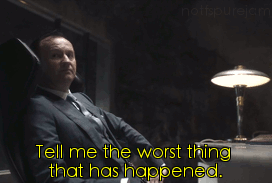
It’s pointed out in the brilliant (if bluntly named) Sherlock Is Garbage, And Here’s Why that Moffat can be a great writer, but is a consistently terrible show runner, because he’s more interested in dazzling the audience with cleverness than actually telling a satisfying story. The video also points out that the show often implied Sherlock’s brilliance, without ever letting the audience follow along with his actions or thought-process in a way that DEMONSTRATED his brilliance.
I highly recommend giving the aforementioned video a watch, because it is not only a great explanation of how Sherlock Holmes can be best utilized, but about how writing itself can be best utilized.
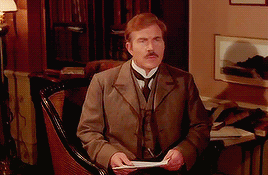
Other examples: The Big Bang Theory. As Wisecrack points out in their wonderful video on the subject, the punchline of every joke is “oh look, these characters are smart nerds!” which is repetitious at best and downright insulting at worst.
How to avoid this in your writing: Treat the audience as your equal. You’re not trying to bedazzle them, you’re trying to take them on a journey with you. Let them be delighted when you are. Don’t constantly try to mislead them or hold intelligence over their head, and they will love you for it. Also, cheap tricks do not yield a satisfying story: readers will know when you went into a narrative without a plan, and they won’t appreciate it.
3. Do remember that smart people can be kind and optimistic!
As demonstrated by: Shuri from Black Panther.
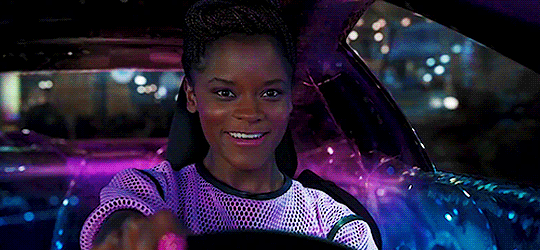
Yes, brilliant people can be unhappy and isolated by their intelligence, or rejected by society. But remember that intelligence isn’t synonymous with a cantankerous attitude, or an excuse to be a pugnacious ass to those around you!
Part of the reason why Shuri of 2018′s Black Panther was such a breath of fresh air was the fact that she subverted almost all preconceptions about how a genius looks, acts, and regards the world. And it’s not just the fact that she isn’t a sullen, middle-aged white man that makes her stand out: Shuri has an effervescent attitude, and genuinely loves contributing to her country and family. She referred to sound-proof boots as “sneakers” (and then explained the pun when her brother didn’t get it.) She’s fashionable. She teases her older brother, and cries when he is apparently killed. She’s up on meme culture. This makes her unlike pretty much every other genius portrayed in the MCU.
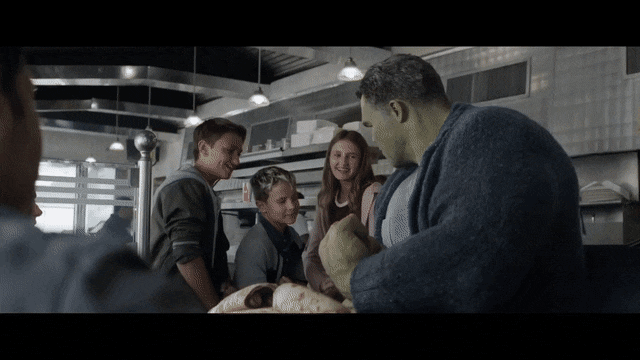
Except maybe the Hulk. He can dab now.
Shuri is also allowed to take pride in her genius, and can be a bit insufferable about it, which makes her more enjoyable and rounded. But she is an excellent example of how genius can be explored and portrayed in fiction, and I will forever be embittered that she was underutilized in Infinity War and Endgame.
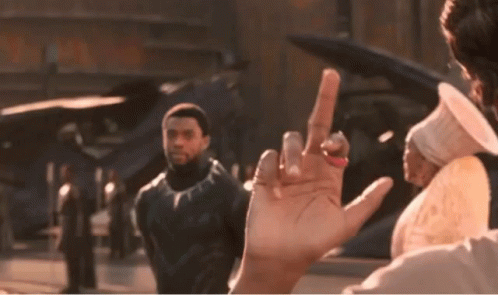
Why, for example, are all geniuses portrayed as arrogant misanthropes? Albert Einstein battled depression, but he is also said to have enjoyed blowing bubbles and watching puppet shows. He was kind to those who knew him. Similarly, Alan Turing behaved little like his fictional counterpart, described as “shy but outgoing,” with a love of being outdoors. Nikola Tesla fell in love with a pigeon. Why do we have to portray these people so damn gravely?
Other examples: Spencer Reid from Criminal Minds. Also an excellent portrayal of an intelligent person on the autism spectrum, as he struggles to interface socially but cares profusely for his fellow human beings. He is brilliant, and completely precious.
Also, Sherlock Holmes -- the original version, and all faithful adaptations thereof. Anyone who thinks Sherlock is an austere, antisocial jerk isn’t familiar with the original canon. He blushed when Watson complimented his intelligence, for God’s sake.
Then there’s Elle Woods from Legally Blonde and Marge from Fargo. Brilliant, upbeat, optimistic geniuses.
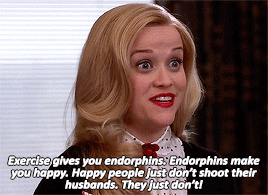
To apply this to your own writing: If you have a smart character who hates everyone around them for no identifiable reason, ask yourself why this is necessary and what this adds to the plot. Are they angry about injustice, towards themselves or others? Are they frustrated with an inability to relate to people? Do they want to protect themselves or their family at all costs, including politeness? If not, question why your brilliant character can’t also be kind to those around them.
4. Don’t make your character perfect at everything they do.
As demonstrated by: Wesley Crusher from Star Trek: The Next Generation.
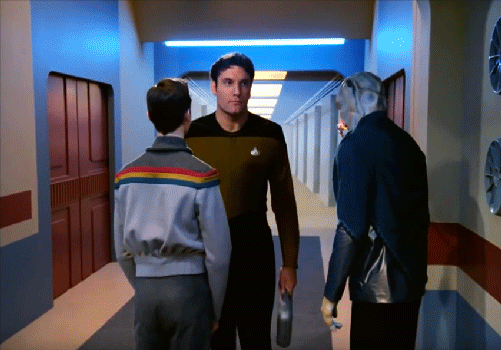
Ah, Wesley. Some call him the original Mary Sue, and it’s one of the only times I’ve seen the term applied with some accuracy. He is somehow the most gifted and least qualified person on The Enterprise. He’s Hermione Granger without the charm, jumping in to answer questions before any of the trained officers in the room have the chance to, always in the right. His only obstacle? Why, the boorish adults he’s surrounded with simply don’t understand his brilliance!
As early as the series’ very second episode, Wesley -- inebriated by an alien illness -- forcibly takes over the ship from Captain Picard, only to later save it from a threat with a reverse tractor beam of his own design.
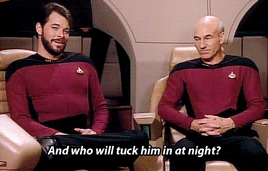
Wesley was obviously inserted as a means of attracting younger viewers, but failed egregiously, because he was too annoyingly perfect for kids to relate too, and not cool enough for them to be invested in. I binge-watched the various Star Trek series in my youth for Spock, Data, and my wife Seven of Nine, not to watch seasoned military and scientific officers get lectured by an adolescent. Even Wil Wheaton, who had the misfortune of portraying this character, expressed a dislike for him.
Precocious children are great, if you get them right. But get them wrong, and they can easily become your most annoying character, marring the face of otherwise great media. The most important thing you can do for a brilliant character is endow them with weaknesses and flaws -- even something as small as Shuri’s fondness for teasing her older brother made her enjoyable, as anyone with siblings could relate to their dynamic.
But, what if you want a supernaturally talented character who not only fails to be a ray of sunshine, but is something of an arrogant, antisocial jerk? Can they still work, especially if they also happen to be a child?
Yes, under one extremely important condition:
5. Do keep your characters out of their depth!
As demonstrated by: Number Five from Umbrella Academy.
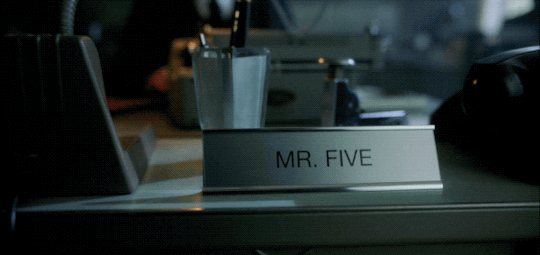
Okay, he’s not exactly a child. He’s a fifty-eight-year-old trapped in a child’s body, who’s traveled back in time from a post-apocalyptic future to warn his siblings of an incoming Armageddon. In other news, Umbrella Academy is a weird show. Unlike the comics, however, the apes don’t engage in prostitution.
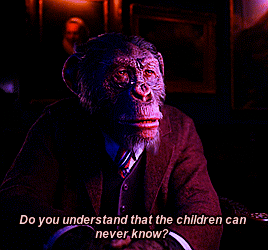
The effect, however, remains the same: a preternaturally talented child who talks down to everyone around him, including his (apparently) older siblings. So why does he work while Wesley fails so egregiously?
For one thing, it’s demonstrated early on that Five has the skills to back up his sanctimonious attitude, with the delightfully ultraviolent Istanbul (Not Constantinople) sequence. It also helps that he lacks Wesley’s squeaky-clean moral code, to the point at which he can get drunk in public or kill without remorse.
But: the element most vital to his success as a character is the fact that he’s kept completely, and consistently, out of his depth. He knows the world will end in eight days, but he doesn’t know how this will transpire or how to stop it. Ultimately, he fails again to stop the apocalypse, and must travel back in time with his siblings for another chance.
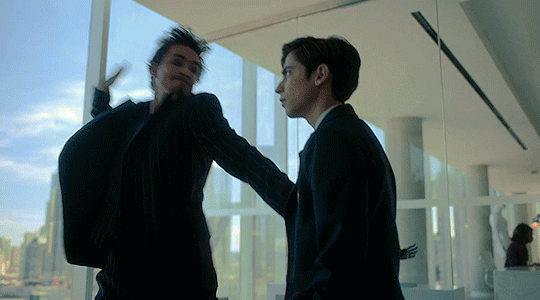
Most authors have the impulse to demonstrate a character’s brilliance by allowing them to succeed against insurmountable odds, but the Umbrella Academy writers show tremendous wisdom in allowing Five to fail. This allows the audience to empathize with him, and countermands the effects of his arrogant attitude.
This advice isn’t just true for pint-sized prodigies. Look back over this list, and take notes of how often the most successful characters are allowed to fail, to have flaws, and to ascend past their comfort zone.
Other examples: Virtually every successful example on this list.
Tommy Shelby, a character of limitless ambition, conducts a new, perilous climb outside of his social rank each season, which almost always puts him in positions of mortal danger. He faces threats both external (rival gangs, evil priests, and rising fascists) and internal (hello PTSD, suicidal tendencies, and crippling addiction) but either way, we understand that his fast-paced climb is not for the weak-willed or faint-hearted.
Mark Watney is a brilliant scientist who has been stranded in an utterly impossible situation for which absolutely no one could be adequately prepared (spoilers: it’s on Mars.) We are drawn in by his plight, and how he could possibly escape from it, and there we come to admire him for his courage, optimism, and humor.
Shuri, though not the main character of Black Panther, is allowed to show off both tremendous gifts and vulnerability, as she is powerless to stop the apparent death of her beloved older brother. She watches Wakanda’s takeover both as an innovator and a young woman, and a large reason for her success is that she is allowed to be both.
How to apply this to your writing: When portraying intelligent characters, take stock of how often they fail, their level of control over their surroundings, their vulnerability, and their flaws. We don’t want to read about flawless deities. We want to read about characters who embody and personify our humanity. So remember they need to fall down in order to pull themselves up.
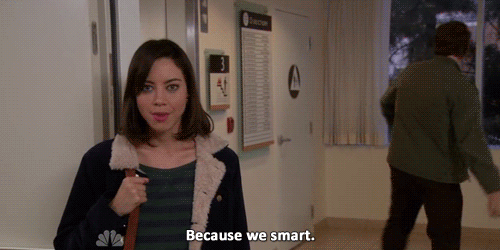
Happy writing, everybody!
#long post for ts#writing tips#writing smart characters#peaky blinders#tommy shelby#mark watney#the martian#miss fisher's murder mysteries#shuri#black panther#spencer reid#criminal minds#legally blonde#fargo#number five#the umbrella academy#star trek#star trek: the next generation
917 notes
·
View notes
Text
Perspective: Killing Eve Season 3 Retcon – Can a show Retcon itself into a different genre?
Recently, I learned about the term ‘Retroactive Continuity’ and I am pretty proud of it because now it sounds like I know what I’m talking about. Retroactive Continuity, or retcon for the intimate like me, is the addition of new information that changes or reinterprets events/narratives previously established, therefore opening new possibilities for the future. It can correct inconsistencies, change world/character limitations, or allow for a dramatic plot twist. For example, a character previously established as an incurable psychopath goes on an emotional growth journey. Killing Eve got fundamentally retconned season 3 and it changes everything. And I need to talk about it. (Look, it’s been a while I wrote this and re-addressed some points here :) )
Villanelle is not a psychopath anymore, I guess
Villanelle was written explicitly as a primary psychopath meaning she was mainly born this way®. Which is different from a Secondary psychopath, whose emotional developmental arrest is caused by disturbingly severe neglect and abuse in early infancy. The impairments in their brains and psychological development prevents them from thinking and, most importantly, feeling like a regular person do. They have a different subjective experience. Psychopathy is incurable in adults, which sets limitations to character development.
Villanelle can’t empathize, perceives people as objects and is very utilitarian. She doesn’t know how to show people she likes them, and her idea of love is possession. Endearing as she is, this is the character the writers wrote. And this is the character portrayed to us in the show. Villanelle is unapologetically a psychopath. She is remorseless, amoral, derives pleasure from killing, all the better to get paid for it. She is basically a self-indulgent goddess. This is enunciated repeatedly in Season 1. Of course, we are not just told, we are shown. Her face glimmers in every kill with enjoyment and cruelty. She is able to conjure any emotion to manipulate – depicted more terrifyingly with Nadia. She emulates emotions from others to connect with people like depicted in the opening scene. My favorite chilling moment is when she gives the “what it is like to die” monologue to Frank, just to terrify him before killing him. Or this face:

Season 2 dives deeper into her psyche where she tells us how she feels, or better yet, doesn’t. We establish she feels this overbearing boredom and seeks to feel anything, so she collects things (or people, no difference) that make her feel something and these things she cherishes by possessing them. The poverty of emotion is reiterated. Again, we are shown, not only told, time and again. The writers are quite clearly asking us to just accept Villanelle for what she is: a psychopath. Like Jodie Comer said herself during that season: “I think some people are bad and that’s what they are, and I don’t think she should be redeemed.” It felt impossible to make it more established within the narrative and the world building. She is, like all adult psychopaths, incurable. These are the character’s limitations, in a purely storytelling sense.
Then, Season 3 happened. In season 3 Villanelle’s character’s development is irreconcilable with the previous seasons. Much of the character’s limitations were simply erased to give her room to “grow”, starting early with one of my favorite scenes of the entire season:
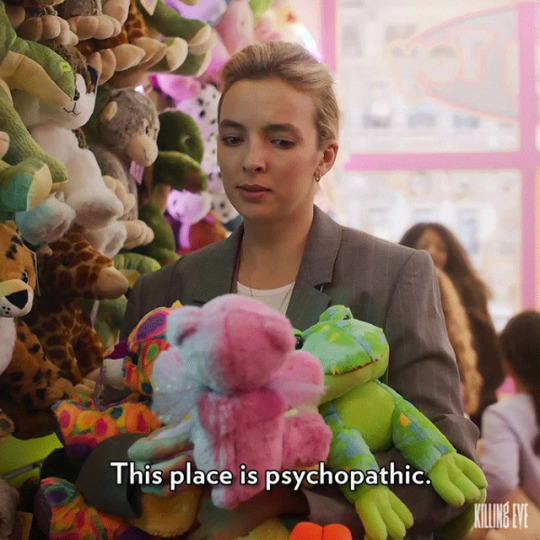
It was marvelously shot and so symbolic. This time around she is gifting Eve something intimate and safe: a teddy bear. Then we have Villanelle by herself and vulnerable, stripping the layers of her feelings towards Eve, the mask of anger cracking as she tries to convince herself she wanted Eve dead, to finally giving in to longing. Her own words are repeated back at her in a loop in a little booth. It was an admission. The booth, the privacy, the lighting, the acting: It was a confession. More than that: it was a love confession. As if falling in love was something she could now do? I don’t want to entertain the actual nature of her feeling, but this is a level of emotional complexity she is just prohibited of displaying by the character’s limitations. And yet, it happened. And I will argue, all the elements of this scene deliberately lead the audience to believe these were romantic feelings.
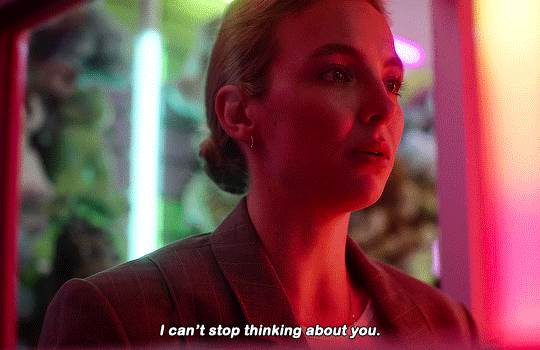
But this is foreshadowing, and the major shift in perspective happens in her bottle episode. In this episode we see Villanelle display genuine empathy and care for her brothers, not only by sparing them but by giving them more than enough money to go see Elton John. A bonna fide display of correctly conveyed affection and consideration. Which, again, is prohibited by the characters limitations. Then the episode builds the narrative that her “psychopathy” was the result of her abusive upbringing, especially in the confrontation with her mother, when we are clearly asked to side with Villanelle.
Here is where the show subtly retcons Villanelle’s character. It cleverly never denies she is a psychopath. It retcons her ability to emotionally grow, by shifting the emphasis to childhood trauma. Nevertheless, for Villanelle as a character, the emotional growth is still prohibited – despite of trauma. The sleight of hand is passable because audiences (actually, any empathic human being) find it incredibly hard to grasp that trauma cannot be overcome. That’s why it feels plausible she has a very complex, deeply transforming emotional response to killing her mother, despite still being a psychopath. Because that is a response that feels plausible to us, the audience, despite being inconsistent with what is plausible for the character’s the inner experience of reality.
This shift not only changes all the interpretation of her character that was previously established but also changes all future interactions. Here is where we see Villanelle getting conflicted about killing, not in a utilitarian sense of it being impractical or boring, but in an emotional struggle. She starts to worry about how others perceive her, and specially that she is perceived only as a “monster”, pointing to a development of a moral compass, deeper self-awareness, self-evaluation and ability to feel remorse. This is all not only incredibly far-fetched: it was prohibited. This is a clear break in continuity from the character of previous seasons. However, after S3E05 it feels plausible.

Villanelle is a carefully crafted monster
We are, then, asked to believe that Villanelle was made into a ruthless killer, which logically follow can be unmade. Hence, her past needs to be explored so it can also be somewhat resolved, symbolizing the undoing of her atrocious (but delightfull?) persona “Villanelle” (the distinction between Oksana and Villanelle was useless before and should still be. But now it feels like it makes sense). Initially, it was established that her mother died, and she had an abusive drunk father who abandoned her in an orphanage. While I believe there was potential in creating a convincing traumatic abusive background from the established narrative, it may have seemed too unsettling to have a man mistreat an infant, which might explain the writers choice for such through retcon. Transferring the source of the neglect to the mother, might heighten the stakes, since daughters are expected to develop a strong bond and mirror their mothers. Thus, adding depth to their face-off and making her murder more symbolic. Addicionally, a full house – with her mother, stepfather and brothers –would allow Villanelle to flesh out her relationship to family and explore the conflict more thoroughly before confrontation. Despite the symbolic tension, in the end we have no definitive answer to the nature x nurture question, nor to what happened in Villanelle’s infancy, except that the metaphorical darkness may have been passed on from her mother.
Villanelle’s joy in cruelty is the most alienating aspect of her character – also the most gripping – and thus, in order for her arc to be more digestible and relatable, it also needs explicit retconning, which is mostly explored through her relationship with killing. Therefore, her cruelty is also displaced to her abusive upbringing. Most specifically, displaced to another character: Dasha. She is the source of the cruelty transmitted into Villanelle through severe trauma during her teenagerhood, ingeniously avoiding the gravity of discussing infant abuse (Dasha brings a downpour of plot inconsistencies). This is unmistakably conveyed in this scene:

Villanelle was something soft and whole that got broken and reshaped into steel, into a stone cold killer, by external forces. Thus, Dasha is an estranged mother figure from the past who tortured Villanelle into a killer, mirroring the dynamic between Villanelle and her mother. Since there is no clear narrative surrounding her early infancy, and her mother needed to be killed to spark the transformation, Dasha becomes the surrogate through which the conflict of Villanelle’s transformation can be explored. The story doubles its efforts to get the audiences to not only believe Villanelle can change, but also that she deserves to change. And here is where we enter dangerous territory.
Killing Eve is not a spy-drama anymore, it is a rescue romance
I stand with the writers, Killing Eve was not a romance. Not until Season 3. The topic of how audiences, especially queer fans, perceive the show as a romance is worth a whole essay on its own. However, in Season 3, audiences are treated with a romantic atmosphere (remember the teddy bear scene?). Everything is toned down; the pace is slower and the investigation is put to the side. The cat-and-cat game is replaced with this reinforced sense of destiny, of fate, where characters seamlessly come together, as if all their actions were just leading them up to that moment. Their approach carries no sense of danger, their obsession is replaced with anticipation. Characters stop thinking about each other neurotically, that scrumptious voyeurism is gone. Character’s don’t need to be reminded of each other. There is no need for it anymore, it has been written for them. They will meet each other, no need to pursue.
Gone is also Eve’s curiosity and intrigue about Villanelle, along most of her character’s motivations, with one simple retcon: Eve wants to rescue Villanelle.

To which Eve replies: I don’t think so. Meaning “I believe there is more to Villanelle than killing and I will cling to that” (Why, we don’t know. But that’s for another time)
Previously, despite the irresistible attraction Eve felt for Villanelle, the story never portrayed Eve as trying to redeem her. It was precisely the fact that they are polar opposites that brings them together, each trying to quench a deep hunger through the other, in all the wrong ways. Eve pursues in Villanelle much of her unfulfilled impulses and is challenged to embody them herself. Eve’s never been attracted to what Villanelle might have of redeemable, she was drawn to what Villanelle had of profanely feral. On the other hand, Villanelle longs for the safety and intimacy she sees in Eve but has no way of even comprehending what it means.
This honesty to the character’s true desires and realities is what has allowed the show to explore an enticingly destructive dynamic while avoiding romanticizing it, which would downgrade the show to a disservice. However, ultimately, there is a writer trying to sell a story. And in this case, they are setting up a redemption arc within a romance, despite character desires and realities not aligning with that. But in season 3, Villanelle’s psychopathy got retconned to make her crush on Eve without it being too problematic and Eve’s past season character development got simply blissfully ignored so her crush on Villanelle could flourish without it being too problematic, and in the end, their attraction got stripped away from all it’s complexity and danger so they could bring characters together without it being too problematic. These characters got rewritten to give us the tease of a romance we have seen iterated one million times elsewhere.
The premise of the show was to explore the dangerous temptation to bite the proverbial apple. Still, at some point the tension needs to be resolved, and the writers decided to shift it to a rescue romance. A very slippery slope. A slippery slope to romanticizing disturbingly destructive relationships, to perpetrating the cliché that “Love redeems all”, even psychopaths can change if they have someone who believes in them – not only dangerously dishonest but painfully dull. As if somehow having your life and your sense of self ruined for a person is some sort of martyrdom to match the person’s redemption itself. What a beautiful pair they would make, cozy in heaven. But damned be the day Killing Eve becomes cozy. While writing the redemption of the serpent and the power of female love despite the obliteration of Eden; they forgot the most delicious part of the story was the apple.
#killing eve#killingeve#killingeveperspectives#killing eve season three#killing eve s3#killing eve review#killingeve retcon#villanelle#villanelle retcon
50 notes
·
View notes
Note
If hatred begets hatred is what you get from all the violence what massage does killing eren(people who love him) make? I don't get what isayama is trying to say anymore, if eren is saved it's also lame because what was the point of all of this death
Hi, anon! I’m going to have to split some hairs here, I’m afraid. “Hatred begets hatred” is not necessarily what I got from the violence - it’s what the dude delivering the speech in 134 got from it. The distinction is important.
As for Eren being killed by people who love him… I’m not sure what connection you’re making between that and the idea being expressed in the speech. Are you equating violence to hatred, setting it opposite to love, and saying the actions of the alliance are not the actions of people who love Eren? I think it’s more complicated than that when there are lives in the balance. It loops around and becomes less complicated again when it’s the lives of the entire world in the balance. Hatred is a non-factor in this decision being made out of necessity.
“Necessity”
Huh.
Necessity is a much more interesting motivator than Hatred in my opinion, and one that has driven almost every violent act in this story. If we want to examine what Isayama is trying to say, that’s probably a more fruitful place to start. Was it necessary to:
- send thousands to their deaths after the fall of Maria to ensure social stability and survival of the remaining population?
- break down Wall Maria in an effort to recover the Coordinate and save the world?
- kill Marco?
- let the people of Stohess die?
- snuff out individuals who threatened stability within the walls?
- torture MPs for information?
- kick fellow Eldians off the wall?
- imprison Eldians in internment zones?
- train child soldiers?
- reveal the true history of the Great Titan War to the world and declare war on Paradis?
- orchestrate an attack on Liberio?
- help Eren and Zeke with the attack on Liberio?
- overthrow the old order to restore the Nation of Eldia/ the Eldian Empire?
- etc, etc, etc.
The point of asking these questions is NOT to judge or justify any of these actions. It is NOT to say that they are all equivalent. It is simply to point out that every person who made these choices would, at the time of making them, answer “yes” and believe it to be true. These overlapping themes of fate, choice, regret, and ignorance vs. information just keep popping up! How many times has a character done something they wished they didn’t “have” to do after saying they had no choice? How many times has somebody questioned, “was there another way?” How many times has somebody done something awful, with varying degrees of regret, in the name of beliefs founded on incomplete information or cleverly sold stories? It seems to me that Isayama is making less of a definitive statement and more of an observation as he invites the reader to ask questions of the characters, of themselves, and of the wider world. How do we come by our beliefs? How do our beliefs affect our actions? Which of the evils in the world do we deem “necessary” and why? How free are we in our choices when we “have no choice”?
Eren and Armin are the characters who have most directly embodied these dilemmas recently (with the added element of Future Vision on Eren’s part), and I for one am very much looking forward to seeing how Isayama is going to continue exploring these themes in the final confrontation between them. I think if there’s a direct message that Isayama is trying to convey, that’s when it’s going to come out. But honestly, I expect that the message is likely to come in the form of questions to be examined. I’m down for that, I think. I don’t really want to be spoon-fed a message, and I don’t think Isayama ever intended to do that. Final thoughts pending the conclusion of the story.
Regarding the last part of your ask: “If Eren is saved it’s also lame because what was the point of all this death,”
First of all, I just can’t see Eren being “saved”. Interesting word choice, by the way. Saved from what? Death? Disgrace? Misery? Slavery? If he’s going to be saved from anything, I think that last one is most likely considering the hints we’ve been given that the Attack Titan may have a will of its own. But that could be a series of posts all on its own haha. Your question is: what was the point of all this death?
Does there have to be a point? I don’t think so. Narratively, sure, the point is to compel the characters to action and make them and the readers wrestle with what ends justify what means, and the way it is being depicted (as an absolute HORROR) is meant to convey as clear a message as we’re going to get (what is happening is bad). But in the world of Attack on Titan, unless there is an outcome that Future Vision Eren is aiming for that we don’t know about yet and that for some reason required it, this massive destruction may very well be pointless. And that may actually be the point. Again, final thoughts pending the conclusion of the story. Sorry for the cop-out, but I just don’t feel like I have enough info to call it. ¯\_(ツ)_/¯
I, uh, hope I actually answered your question. It’s hard to give any straightforward answers for something as twisty as all of this is right now. I’m just playing a ~fun~ (🙃) game of Thought Experiment about it.
12 notes
·
View notes
Note
⭐ for the ask game!
Playing STRAIGHT to my ego, huh? Thank you for the question! Let’s do Martin and the Dream Boy, since I’ve been thinking about that one again recently:
“Transfer me,” Martin said immediately.
“No,” Jon said, equally quickly.
“Do it.”
“I won’t. You wouldn’t survive the month.”
“I’m not going to survive the month anyway. Don’t you get that, Jon?” Martin said, frustrated. “None of your perfect little worlds last. Nothing ever works out. There’s always going to be something that destroys this. More than fifty times, you’ve tried, and more than fifty times you’ve failed miserably. Isn’t it time to try something else? A different approach?”
Jon stared at him blankly, the forehead eye open wide, in a classic ‘does not compute’ expression. “I just have to keep trying. It’ll work eventually.”
“You’re stuck . Literally and - and figuratively. You’re stuck in this self-perpetuating loop where you make the same mistakes, do the same things, and fuck up your life in the same way, over and over again. And you refuse to see it.” Martin stood up, slamming his fist on the table, and Jon’s eyes widened. All of them. “You’re weak and cowardly. You ask for my help, because you’re lonely and in pain, but then you reject it, because you’re afraid of anything else. You bitch and moan about how terrible your life is, but you refuse to do anything real to fix it. You push away all of your friends, everybody who wants to help you, and then complain about how nobody cares. I’m sick of it. You’re - you’re just like me. You’re fucking just like me.” A sob bubbled in Martin’s chest, and he tried desperately to push it down. “I guess we were made for each other after all. We’re both terrible people in the exact same way.”
Jon opened his mouth, then closed it, flabbergasted. “Martin…”
“Forget this.” Martin turned away and stalked to the door, throwing it open. “Have fun with your hamster wheel. I’m going to actually do something.”
For context, this story was written before I listened to S4 and S5. (Feste was written about when I was listening to very early S4). I’d probably tweak some aspects of it with my understanding of how Jon’s loneliness was perpetuated in S4, but overall I’m very glad that this story captured something essential about Jon’s character that we see in the beginning of S5: that he will sit alone, in an empty room, listening to tape recordings of his friends back when they were all a little less sad. He is overcome with guilt and self-loathing about what he’s done, and he refuses to confront it.
That is what Jon is doing basically this entire story: listening to his friends be happy, back when they were all just a little bit less sad. Overcome with self-hatred, he chooses to lose his identity and with it any chance of fixing the situation, instead of taking responsibility and fixing it. He thinks that everything is his fault, and that he’s the only one who can ever fix it, but confronting what he’s done is so scary that he shuts down.
This is the point in the story where I kind of beat you over the head with the narrative parallelism. It is very obvious to the reader that Jon is doing the wrong thing, because when Jon lashes out due to trauma he does it explosively and harmfully. When Martin does shitty things due to trauma, it’s a little less obvious. (This is also true in canon and something I wish more people realized about Martin). I built up a huge bait and switch in this story, because I wanted the reader to realize something about Martin just as Martin did: that his caretaking personality is a damaging trauma response, that his focus on romanticizing somebody who he barely knows instead of making the effort to understand them is harmful, and that it’s more important that he put on his own oxygen mask first instead of trying to help other people. Martin’s selflessness was selfish: it made him feel good to be needed, and to rescue someone. I think Martin and Jon are very similar in their martyr complexes - which bites both of them in the ass in the canonical Season 4, when they both use these complexes as a vehicle for attempting suicide. It’s not good for them, chief.
Martin, of course, is a good person. Jon is also a good person. In this story I explored the question of how good people, with good intentions, from a place of deep love and care, can do terrible things. Neither Martin nor Jon ever wanted to confront their own behaviors and their maladaptive coping mechanisms, because that would involve admitting that they were sad and lonely and they needed help (The only TMA characters to ever do this are Daisy and Melanie, especially Melanie). Whenever I write Jon, my central tenet for him is always “coward”. Martin’s is always “brave”. I think they’re a very interesting pair, both in their similarities and their differences!
Thanks for the question! I would apologize for the length but I think everybody expects that of me now.
#honestly I was very concerned while posting this story because I was worried that people would not understand what I was trying to say#especially about jon and martin#every single tma character is a dick who does dick things because they're in pain#martin is included in this#he just gets away with it because his trauma reflex is to be Nice (TM)#love him and his southern passive aggressiveness but its not helpful chief#and i was also worried that people wouldnt get that jon is acting from a place of extreme pain and good intentions#ultimately the fact that every commentator seemed to EXACTLY understand the very complex message I was trying to send#is what made me so satisfied with this story#that i was able to express a complex character in a nasty situation#and have people understand what i was trying to say about people and how people work#It's made me realize I've grown as a writer since the LAST time I tried to do this and I failed utterly#my writing
17 notes
·
View notes
Text
Dear Chocolate Box 2021 Author
Hi! Thank you for writing for me! I’m reconditarmonia here and on AO3. I have anon messaging off, but mods can contact me with any questions.
Elsinore | Fullmetal Alchemist | The Locked Tomb | Motherland: Fort Salem | Simoun
General likes:
– Relationships that aren’t built on romance or attraction. They can be romantic or sexual as well, but my favorite ships are all ones where it would still be interesting or compelling if the romantic component never materialized.
– Loyalty kink! Trust, affectionate or loving use of titles, gestures of loyalty, replacing one’s situational or ethical judgment with someone else’s, risking oneself (physically or otherwise) for someone else, not doing so on their orders. Can be commander-subordinate or comrades-in-arms.
– Heists, or other stories where there’s a lot of planning and then we see how the plan goes.
– Femslash, complicated or intense relationships between women, and female-centric gen. Women doing “male” stuff (possibly while crossdressing).
– Stories whose emotional climax or resolution isn’t the sex scene, if there is one.
– Uniforms/costumes/clothing.
– Stories, history, and performance. What gets told and how, what doesn’t get told or written down, behavior in a society where everyone’s consuming media and aware of its tropes, how people create their personas and script their own lines.
General DNW: rape/dubcon, torture, other creative gore; unrequested AUs, including “same setting, different rules” AUs such as soulmates/soulbonds; PWP; food sex; embarrassment; focus on pregnancy; Christmas/Christian themes; focus on unrequested canon or non-canon ships; unrequested trans versions of characters.
Smut Likes: clothing, uniforms, sexual tension, breasts, manual sex, cunnilingus, grinding, informal d/s elements, intensity.
Requesting fic; open to art treats!
—
Fandom: Elsinore
Relationship(s): Hamlet & Ophelia; Hamlet & Horatio & Ophelia; Bernardo & Hamlet & Laertes & Ophelia
I found the friendships in this game, and the different ways that characters can reconcile or try to find a way forward together, to be really sweet and moving, and I'd love to read something that focused on those relationships of trust and support. I like how important Ophelia and Horatio's counsel and friendship is in timelines where Hamlet becomes king; I like Hamlet regretting how he behaved towards Ophelia and striving to live through his depression and find out what it is that he wants, not what everyone else wants of him; I like seeing childhood friends Bernardo and Laertes and Ophelia and Hamlet, whose growing-up has stretched them so far apart, taking time to catch up and enjoy each other's company a little.
So, futurefic in one of the timelines where everything doesn't go to shit? A timeline that we don't see? (There is something narratively interesting to me in Permanence/Passion in that the entire plot of Hamlet ends up as a distant backstory to someone's full life; I don't know how compatible that idea is with these requests, but if you want to write any of these groups fucking off to Italy or Constantinople or London and living until the Elsinore pressure-cooker is a distant memory, I'd be just as happy with that as with fic about them building some kind of future together still in Denmark, trying to make it better for its people and to hold on to who they are as individuals, and friends, beyond their roles.) If you want to write Hamlet/Ophelia, Hamlet/Horatio, or for that matter Horatio/Bernardo as shippy, I'm fine with that, but I don't want a focus on the romantic aspects of their relationship.
Fandom-Specific DNW: death of requested characters within the timeline being explored, or focus on death of requested characters. These characters die in this game a lot and I don't need you to pretend entirely that it's not a time loop game, but I would like them to be happy. If you write the Bernardo & Hamlet & Laertes & Ophelia request, I'm fine with either or both names/pronouns for Bernardo|Katherine, but I don't want to read a story focused on their gender or coming-out. Please don't include Peter Quince as a character (you do not need to retcon, you know, the existence of the time loop).
—
Fandom: Fullmetal Alchemist
Relationship(s): Maria Ross/Olivier Mira Armstrong
I'll admit: I am a shallow, shallow person who loves the heartwarming and id-satisfying Briggs loyalty-kink complex (The watch! Buccaneer handing Olivier a clean pair of gloves after she kills Raven! Constant and deeply sincere saluting! Olivier’s explanation of why she wants Miles around and her lack of patience for anyone’s shit) but would like an f/f manifestation of it for actual shipping. Post-canon or AU where Maria is assigned to Briggs, or works for Olivier in Central? Does Maria foil a plot against Olivier, or Olivier save Maria's life in battle? Does Olivier order Maria into a firefight? Hit me.
Fandom-Specific DNW: Olivier/men, even mentioned.
—
Fandom: The Locked Tomb
Relationship(s): Abigail Pent & Dulcinea Septimus; Gideon the First & Matthias Nonius
Dulcie and Nonius were two of my favorite additions to the cast in Harrow the Ninth (and Dulcie in "Doctor Sex" via letter). I loved everything we learned about Dulcie - her wit, her quick thinking in a pinch when confronted by Cytherea and her secret to Harrow. I found her "The only thing preventing me from being exactly who I wanted..." speech both genuinely moving and very funny, and I love her thirst for revenge. What else might she and Abigail Pent, "independent research? it isn't even my birthday!" daredevil spirit-talker par excellence who has just conjured up a ghost out of an epic poem, get up to after Harrow's bubble collapses? Or what were they up to when they weren't on screen in Harrow's dream, putting together this whole, well, play?
Nonius's arrival, entire scene, and departure to fight the Beast made me very, very happy on levels I have trouble explaining. It was so heartwarming?! Because it was impossible, and because poetry won, and because they went off to do the best they could...I don't know, exactly. I'd love to read either more about his mysterious past with Gideon the First, or about their second encounter as allies (throw in Marta, Ortus and Pro if you like as well!)
Fandom-Specific Exception: to my unrequested ships DNW, Dulcie/Cam & Dulcie/Pal. I love their three strand thing.
—
Fandom: Motherland: Fort Salem
Relationship(s): Abigail Bellweather/Raelle Collar
I fell hard for this show and Abigail/Raelle is the ship I’m most excited about - they get off to a bad start for all kinds of personal history reasons and have problems with each other, but when it gets down to the wire Abigail would do anything for Raelle and is very gung-ho about having Raelle’s unconventional but extremely powerful magic under her leadership, regardless of Raelle being a loose cannon. She told her she loved her!! <3 And by the end, Raelle also clearly knows what Abigail's going through (like when she talks her down in "Citydrop"), respects her leadership, and cares deeply about her and wants to protect her in return. I love that loyalty dynamic, and their competence as fighters/witches.
Physical combat, strength in general, magical strength, ability to work magic together, knowledge of the magical canon vs. out-of-the-box techniques...what parts of their skills and their bond could be challenged in the weird dimension that the end of season 1 leaves them in? Or when they get back home and new challenges await? (In my head, the decision not to send them to War College is not revoked; the unit becomes some kind of special-forces secret strike team rather than cannon fodder.) Maybe something where Raelle goes/has gone into a fight as a berserker-type for Abigail and then comes back to her, or where Abigail protects/has protected her soldier (her girl!! I love her protectiveness of Raelle towards the other cadets, imagine it in a battle!)? Or an arranged marriage AU where it's usual for witch soldiers to marry to combine their magic power or something...
I would also be up for smut for them, especially something d/s-y where the loyalty-kinky dynamic of Raelle being Abigail's weapon, at her command, is echoed in sex!
Fandom-Specific DNW: sex solely for magical purposes without an emotional connection (sex for magical purposes is fine), focus on Raylla (I don't need you to retcon it, but please don't dwell either on Raelle still having feelings for Scylla or on her getting over Scylla for Abigail), Scylla bashing, Abigail/Adil (I would prefer to imagine, if he is mentioned in the fic, that they’re just friends).
—
Fandom: Simoun
Relationship(s): Aer/Neviril; Aer/Neviril & Neviril/Paraietta; Aer/Neviril/Paraietta; Aer & Floef & Neviril & Paraietta & Rodoreamon & Vyuraf
Aer, and Aer/Neviril, really grew on me on my recent rewatch. I appreciated her more as the determined bit-of-a-loose-cannon, who grows into a respected role in the choir, than the manic pixie this time, and noted Neviril's comments about how she was drawn to Aer's determination. (I've written a lot more about what I love and am interested in about Neviril and the show in general, her journey of figuring out what it means to her exactly to lead an air force, here.) I'd love to know what happens to them post-canon - what is the "new world" and their travel in it like? It's an escape for them, sure, but what are they escaping to, not just from? Are there problems there, too?
I'd also be up for a poly situation where Neviril is involved with both Aer and Paraietta, her long-loyal second-in-command whom she's blessed and forgiven, as a V where they're friends or as a triangle where Aer and Paraietta are also involved (I don't quite know what that leg of the triangle would look like but I do like how they work together in battle even when they're shown as having personal issues.)
If Neviril and Aer make it back to the main world when war is brewing again, as at the end of the series, but their old cohort can't fly anymore, what do they see their role as being? Does Neviril see herself as a leader for peace, for war, for something else? How do they interact with their former squadmates, whether as part of a more plotty piece or not?
I could be interested in explicit fic for this canon, as an option - the series is, on some level, about the contrast between the reality and physicality of their bodies and the general perception of what they do (which even in its non-spiritual military capacity is removed from a connection to their bodies via the Simoun aircraft), about becoming an adult, and of course about gender.
Fandom-Specific DNW: I'm not really interested in Kaim and Alty and would prefer for them not to appear or for their backstory to come up. I would also not like to see pre-timeskip Dominuura/Limone.
0 notes
Text
Character Arcs: The Four Points of Establishment
Reposting old essays, so information discussed might be a bit out of date, but the core is still relevant.
I want to explore character arcs from a mechanical perspective and break down what I see as the most fundamental elements to making a successful one, because RWBY doesn't really handle them well.
Now, I'd say the easiest way to describe a character arc is that a character overcomes a hindrance of their own design. You can boil a character arc down to a journey across four separate points; lets calls these the 'Four Points of Establishment' that character arcs tend to hit in that order.
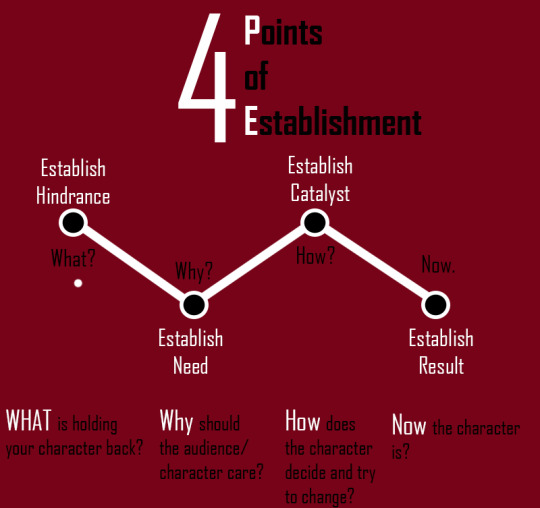
Establish Hindrance - You must show the audience what the hindrance is, what's holding the character back and how hard a thing it could be to overcome. What is the goal of said arc. Pretty basic, you start out most things by establishing what they are.
Establish Need - This is important to getting the audience to get invested in the arc, you need to establish why the character needs to have this arc. What happens if the character does not complete their arc? Why is this important to the character? Fundamentally, I'd say that the need should conceptually be that the hindrance is in some way challenging the character's role in the narrative. The character is the leader who takes their job very seriously? The need can be that their hindrance endangers their team and holds them back as a leader, their role as the leader in the narrative is being challenged because of their own flaws.
Note - I'm not saying that the hindrance can't be internal or personal, I'm trying to say that if it's presented too 'internally' you run the risk of keeping your audience out of the loop and not actually experiencing the character's situation. It's something we assume is naturally happening off screen. The need is a matter of presentation more than anything. When I say that, at worst, they'll bad, I misspoke, as I was trying to demonstrate that the story is doing nothing to present them feeling bad as a driving force or something to care about, because it's assumed rather than experienced. Hope I'm coming out clearer.
Like, how Ruby is supposed supposed to have a problem where she's hiding the pain behind her positive attitude. But it's harder for us to give a damn about Ruby supposedly going through this because aside from Ruby having a token mention once or two to say 'I'm totally suffering and it's real hard guys', we're just told to assume that all the interesting internal problems she's experiencing are happening, we just can't see them. In a show where you can't get inside the character's head, you need a more external showing of your character's state.
Establish Catalyst - The audience needs to see why the character changes, the journey that they're taking and struggling through to prove both how important the arc is to them and how it's not something that they could have easily dealt with before they wasted your time for an entire season of development. This usually goes hand in hand with displaying the need. Back to our leader example, they at first deny such a hindrance exists, but because of the character's hindrance, the team is put in danger, the character is faced with this and works to overcome this.
Establish Result - The final stage of an arc is showing us the culmination of this journey, what has changed in the character now that they have overcome their hindrance. The most basic way this is done is have a repeated situation where the character at the end of their journey is placed in a similar position to one they had at the start only to make a different decision. If the other points have been established well, this should easily be satisfying because not only has the character improved, but you got to feel just how important it is to the character that they did.
Now, where do I think RWBY falters on this? Lets use the tension between Blake and Yang in volume 6 as an example.
Hindrance - Yang and Blake have unresolved tension because of a mistake made in the past, one that neither reacted well too because of their tragic backstories. Blake is too used to seeing herself as a worthless danger to those she loves and thus runs to protect them, while Yang has abandonment issues and deep insecurities that make Blake's disappearance in her greatest moment of weakness devastating as well as ptsd on top of that.
Need - Now, this is where many people, Rooster Teeth included, falter. It's not that they don't establish a need, it's that the need is more self contained and assumed. The need here is that if Blake and Yang don't resolve their problems... They'll probably feel bad. The hindrance only really hurts them on an internal level that, at worst, will have them verbally say 'Dag nabit, this is not good'. It doesn't effect the story or any of the characters around them, it doesn't really effect them because their attitude and action remain the same. Yang and Blake, as character, are not challenged or inhibited by this arc not being completed. Their teamwork isn't dampened, their interactions don't change and it only comes up when they're safe.
Catalyst - As a knock on effect of the need being so minimal and self-contained, the journey there is empty. They can't struggle or have actual self-reflection because the lack of struggle gives them nothing to think about or anything to change. Yang and Blake get over it because the plot says they're over it now, but there's not journey to this point. it's pay off without build up.
Result - See why these are in a specific order? Because it effects the entire flow. There is no result. They were never externally effected by the hindrance and thus there can't really be any resulting change to satisfy anyone. If you cut out this entire arc, you wouldn't notice at all because the character remain the same as they were and nothing was allowed to effect the narrative.
Rooster Teeth seem like they play it too safe with their character arcs. They want the characters to develop, but they also don't want to make the characters face any sort of consequence that puts them in the any sort of wrong. When I look at RWBY discussions where a character has any sort of screw up or lapse in judgment, there's always a legion of excuses for what the character has done. Which, in my opinion, is a terrible thing for characters. Your character should do something where they're in the wrong and it can't be excused, where they have to realize what they've done and apologize. Rooster Teeth likes to have it that both characters involved in the arc are in the right, but that just makes it so that their improvement seems pointless. If they're both right, what's the hindrance?
To better illustrate my thinking, I'm gonna put up an old piece I wrote up about how I'd improve the Yang/Blake conflict:
You know, I keep seeing people, commenting on Yang and Blake stuff, scoff at the idea of Yang getting mad at Blake for abandoning them. "Blake had good and understandable reasons for leaving, so it would just be stupid for Yang to be mad at her"
Yeah, THAT'S WHY IT WOULD HAVE BEEN A GOOD PIECE OF CONFLICT
Yang has abandonment issues and won't look at it in the calmest and logical light, her getting mad at Blake for this would be a rather mean-spirited and narrow-minded thing to say; which is a good thing for character-writing. It would be character conflict that comes naturally from what we know of the character instead of the Telltale 'Character suddenly becomes an asshole to get a conflict going'.
With this, one of two things would most likely happen:
1:
Blake would defend herself and point out how unfair Yang was being to her, with maybe even Weiss jumping in to have her speech from Volume 5, leading to Yang being a bit of a grump towards Blake for a lot of Volume 6, having her either avoid or be blunt whenever Blake tries to talk to her. Their teamwork is also affected by this. You have scenes of Blake trying to patch things up, only to fall flat as Yang gives her the cold should, ending with Blake giving up and just snapping at Yang. Then the Adam fight happens, Yang comes busting in on Bumblebee, Adam takes advantage of their souring teamwork to own most of the battle. Adam gets a shot at Yang, but Blake get's in the way, taunts Blake about the scar, prompting Yang to realize that Blake probably feels just as vulnerable as she does after losing that arm; realizes she's been a prick, apologizes and promises to be a better partner.
2: Blake would, despite not being in the wrong here, agree with Yang and accept the blame. Blake has a lot of self-loathing and is used to blaming problems on herself (And this would be a good situation where it wouldn't come off as a martyr complex). Hell, this would be a good time to enforce the consequences of the abuse Adam supposedly heaped on her, how she's become just so used to her loved ones being hurt by her. For Volume 6, she spends her time disconnected from everyone else because her self worth has reached an all-time low, her combat ability hampered by her now inability to work with her team and her blaming every small failing on herself. When the Apathy happens, it comes mainly to illustrate just how far she's falling, where the Apathy's influence makes her near suicidal ("Everything's fine, Ruby..."), which afterwards has Ruby or Weiss confronting Yang in private about the clear issues her partner is having.
Yang is unsure of how to proceed or how to even make things better. When she goes to try and apologize to Blake, Blake just keeps deflecting everything and saying that Yang was right, she deserves a much better partner. Then, Adam happens. Blake barely fights back, Yang enters and... She hears Adam's taunts, she hears him ranting about all the promises that Blake broke, all the things he did for her, how she hurt him worst of all. And then Yang remembers all the way back in volume 3, after she broke Mercury's leg, where Blake told her that Yang reminded her of someone. This makes Yang fully realize Blake's situation, the effect Adam had on her and Yang's own actions. Yang is forced to confront what she could become if she let her emotions drive her and keeps herself bound by that one tragic incident where her own flesh and blood abandoned her, as well as what she's done to Blake.
Adam charges up a moon slice and goes in to end Blake, but instead of Blake pulling another clone trick, Blake makes no move to try and dodge. She's alone with the two people she 'betrayed' and she's willing to accept the punishment she deserves. However, Yang jumps in the way and the moonslice once more cuts off her arm, the robot one this time, leaving Yang shaky and handicapped. Blake cries out in terror at Yang's predicament, but Yang stops her to yell back her own apologies. She's sorry for the way she acted, sitting that she failed Blake as a partner and only now realizes what Blake was going through. There's a speech about Yang letting her judgment get clouded, how Blake isn't worthless, how Yang was just so afraid of being abandoned again that she couldn't see the reasons why Blake left, ect.
"Right now, we have a restraining order to file on an ex. But, I seem to be missing an arm, so... I'll need a partner. Know anyone, Blake?"
The two work together to beat Adam, they make up, they promise to be better partners and Blake crying about how she won't leave again makes sense this time.
Both of these not only force Yang to confront her issues and how they still affect her, but also bringing full circle what Tai was trying to teach her: She originally took his advice about not letting herself be emotionally driven as just something to apply to combat, but it also applies to how she interacts with her friends as well (This would also semi-relate to how in the other fight happening, Corvo endangered an entire city simply due to letting her wounded pride and anger drive her) as well as semi-relating to the Faunus storyline of letting one situation paint every person's action.
And that's my piece that's gone on way too long in the tone of that english lit teacher you wanted to throw out of the window. To complete this joke I will remind you that I EXPECT YOUR HOMEWORK ON MY DESK BY FRIDAY, NOON, AND NOT A SECOND AFTER!
8 notes
·
View notes
Text
Time is an Egg
Following on from Alan Wake, I was ecstatic to see Quantum Break available on Steam. I’m not sure when they first became available but I was definitely going to buy it on sale. It didn’t matter that I had never owned an Xbox, I was now able to finally play a console exclusive that had interested me for years. With its time travel concept and two actors from the Animorphs franchise, I was eager to see where the journey would take me. Plus, Remedy was also trying to push the fold when it came to video by inserting a television show between major plot points. To many, it might have seemed like an overly long cutscene except with real actors. Akin, perhaps, to old full motion video. I, for one, was just excited to see if Remedy could manage to pull it off the perfect blend between video games and other forms of media.
In Quantum Break, players are put into the shoes of one Jack Joyce. After six years, he has returned to his hometown of Riverport after receiving a message from an old friend: Paul Serene. I loved the environmental storytelling as I navigated the university to meet my friend. The conversation with Amy Ferrero as well as the the posters decrying the aggressive purchasing of land from the shady Monarch company, all served to highlight an ongoing struggle between corporations and the history and culture of hardworking individuals.
It was not long before Jack arrived at the Physics Research Centre, where Paul Serene had set up his Project Promenade and the time machine hidden beneath. Unlike its depiction in other forms of media, time travel in Quantum Break is regarded as a loop. There are no branching timelines or alternate worlds being created. A person cannot go back in time to change the past. In addition, a person can only go as far back as when the time machine was first activated. So, there would be no visiting of dinosaurs or killing Hitler.
Quantum Break sticks to its guns that the past is immutable as it has already happened. But it also implies that when Paul travels to the future and witnesses the End of Time that this fact cannot be changed. Why? Because the event now lies in Paul’s past and defines his entire character arc.
But I’m getting ahead of myself.
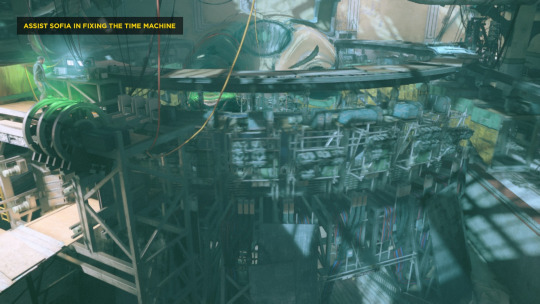
After Jack helps Paul in his less than legal demonstration, something goes wrong and time begins to fracture. He is joined by his brother and men from Monarch. They attempt to escape and in so doing, Jack discovers that he is imbued with time powers. He takes advantage of this, but cannot stop his brother from being crushed (or at least, that is what he thinks happens). From there, Jack is set on the path of stopping his old friend and restoring time.
On the way, he is joined by Beth Wilder and either Amy Ferrero or Nick Masters (depending on your choice when playing as Paul Serene during the first junction point). Speaking of these Junction Points, while they provide choice to the player, the end result is the same. The final confrontation between Jack and Paul is predetermined. None of the changes made to the game changed this fact. Whether the player chose a Hardline or PR approach, whether they trusted Hatch or Amaral - it did not matter.
I suppose that made sense from the rules of the world and how the narrative set up the concept of time travel. Instead of spiralling into infinite worlds and alternate timelines, Quantum Break continued its spiel that time was a loop and that a character’s desire to change it would have only perpetuated the event that they were trying to stop. This was particularly evident when Beth was sent into the future and tried to kill Paul Serene during the End of Time. Or how despite warning the proper authorities, 9/11 still occurred.
It also meant that the ending for Quantum Break remained open-ended. The majority of the game is set in the year 2016. Paul, having seen the End of Time, knew that the catastrophic event would occur in 2021. However, as the events of Quantum Break unfold, it is clear that Paul’s estimate of the breaking of space-time as most people understood it, was happening much more quickly than predicted. So, when Jack was able to use the Countermeasure and stop the stutters, I waited for the other shoe to drop.
Sure enough, Quantum Break teased that there was more to the ending that met the eye. First of all, the interview styled questions that peppered the game were revealed to be at the end. Martin Hatch, who was shot in the eye, was back. Jack looked like he was seemingly joining up with Monarch. The ambiguous ending, thus, clearly hinted at a sequel and that Jack might have been the actual cause for the End of Time.
I also have a theory that Beth Wilder might actually still be alive despite being killed by Paul. How could she not have become chronon-active after being exposed to the Countermeasure in Ground Zero?
Gameplay-wise, I very much enjoyed the aspect of controlling time. I was quite young when Blinx came out. But seeing that I owned a PlayStation, I never got to enjoy a romp with the cat that could control time. This time, I could stop enemies for a select few seconds as I peppered the air around them with bullets and then duck to cover by running as quick as the Flash. I loved these new ways to tackle combat as they presented something different than the usual third-person over-the-shoulder action that I was used to.
What disappointed me, though, about the game was streaming the live-action episodes. Always, I encountered buffering issues with the show stopping and starting. It didn’t matter how good my internet speed was, the connection with Remedy’s servers refused to work as I had hoped.
The Quantum Ripples also proved disappointing because they only added a line or two of dialogue between characters. It never seemed to serve a greater purpose other than to appear as a fun Easter Egg.
I also dearly wanted Brooke Nevin and Shawn Ashmore to share a scene together. Alas, that never happened. At least in my playthrough of the game. The actors that played cousins in the Animorphs series never got to share a scene together.
Gripes aside, I very much enjoyed the time I spent playing Quantum Break. The concept behind the narrative proved to just as intriguing when I was playing it as it had been in the trailer. While many mediums have explored time travel, this one was a much more interesting take on the premise.
I also liked the ability to control time.There was no reversal and making different choices like in Life is Strange, but as a game mechanic, it definitely opened up new ways to navigate the environment and approach combat situations. Unfortunately, the choice of weapons at Jack’s disposal was less than imaginative.
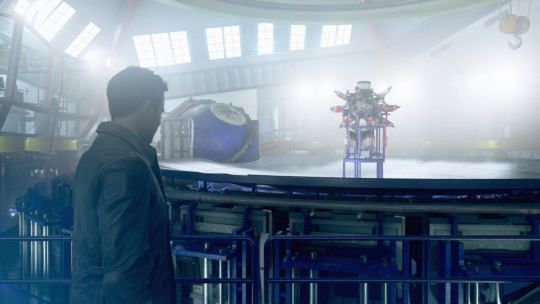
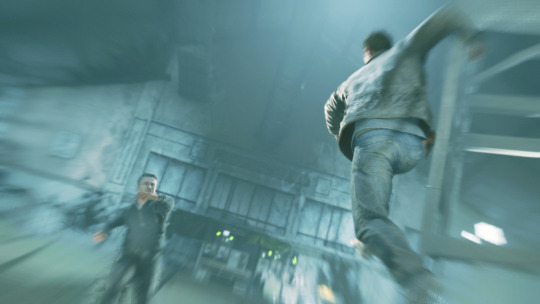
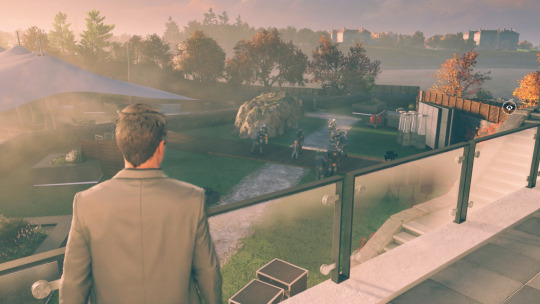
3 notes
·
View notes
Text
Fall 2018 Anime Overview: Bloom into You

Yuu Koito is a girl who’s troubled by the fact she’s never felt the romantic passion she sees so often in shoujo manga and other media. She’s thrown for a loop when the seemingly level-headed and mature student council president, Touko Nanami, suddenly confesses her love for her. Yuu finds out Touko’s calm facade hides a much more complicated person than she could ever imagine.
If you’re someone on the lookout for yuri that tells a sincere and heartfelt queer narrative rather reveling in fetishization and fanservice, Bloom into You is absolutely a series you should check out. If you’re someone on the lookout for a beautifully directed, complex emotional drama that really delves into the struggle with identity and relationships teenagers experience growing up, this is absolutely a series you should check out. If you’re just on the lookout for good anime, this is still. absolutely. a series you should check out.

Bloom into You has a bit of a slow start and builds its narrative brick by brick, but if you’re anything like me or most of the people I know who’ve watched this, it will have hooked with your heart in its clutches by the end.
Part of why I think this series is something special has to do with how it engages so honestly with wlw (women-loving-women) experiences. It acknowledges the obstacles and prejudices wlw face, but also represents that there’s a larger community and wlw can offer each other support and solidarity. It directly confronts the “this is a phase, you’ll grow out of it and want to be with a man” rhetoric, an attitude that is common in real life and also a nasty pervasive under/overtone within some yuri, and shows this attitude is both harmful and wrong.
The anime shows adult wlw living together, in a healthy, lovely relationship, and it specifically shows a teenage lesbian looking at that and realizing she’s not alone. It shows adult wlw supporting and advising the younger generation, letting them know that they can be true to themselves. It’s such a rare treat and so important to seeing a piece of media portraying the solidarity and mentorship between younger and older wlw and it was so powerful to see that character start on her journey of self acceptance.

The queer coming-of-age story ties in well with the central theme of this anime, which is the instability and uncertainty of teenage identity and how that impacts relationships. These are kids who don’t understand themselves, scare themselves, hate themselves, and that stops them from being authentic and honest in their relationships. The theme is there from the very beginning with Yuu, who is uncertain and frustrated about her lack of romantic inclinations.
Yuu is almost definitely not meant to be asexual, at least not aro-ace, something I as an ace personally grokked from the start and was fine with. The show has it right in the title, Yuu is a “late bloomer” and part of her confusion almost certainly stems from repression. This is a valid and important narrative, and one I actually really relate to as a wlw asexual person.

Realizing I was a lesbian was especially difficult for me because I had like, no sexual drive, and it made me feel very alone. I see a lot of that in Yuu’s narrative, whether she’s meant to be homoromantic ace or not (probably not, but I’ll interpret her as one for as long as I can), her story really resonates me and it’s really cathartic and special to just see things like “it’s lonely when everything is centered around romance and sex but that’s something you don’t get, but that doesn’t mean anything’s wrong with you, just explore your feelings and see where they take you and that might be towards other girls” expressed in a narrative. I wonder if I would have realized I liked girls sooner watching this series. It’s very possible.
There is actually a legit aromantic asexual character in this story, who is both very honest and content with having no interest in romance or sex. This character has a discussion with Yuu and his experiences are actually contrasted with Yuu’s to show they aren’t quite the same. That was a pleasant surprise.
I do have issues with how him much “liking to watch” and kinda pry into real life romances was emphasized though. If it had been kept to “I really do enjoy romantic stories despite being not feeling it myself” that would have been fine, but this character being a little voyueristic (he doesn’t go so far as to spy on anyone, though, don’t worry) just gives this kind of weird underlying implication that how aro-aces fill the “void” of not being into romance themselves, and that’s..not true. I mean, there probably are ace people who do enjoy watching the drama of real life relationships unfold, but since he’s the ONLY rep we’re given in the story it doesn’t really do justice to the fact a lot of ace people really AREN’T into that. He’s a fine character otherwise, and I do appreciate the show making an effort to show people who don’t experience romantic feelings exist and are fine, it’s just a niggling little nitpick I have.

The exploration of identity goes beyond romance and queerness. Touko is shown to be someone who has a very deliberately constructed “perfect and poised” persona, but her real self is both complicated and damaged and that makes her relationship with Yuu very complicated too. She’s perfectly okay with Yuu not loving her back and almost seems to relish it. It’s VERY screwed up, but the show fully engages with that and does a wonderful job exploring how MESSY teenagers trying to figure themselves out are. Its character drama at its finest.
As screwed up as Touko is, the show has her learning to respect Yuu’s boundaries and get her consent on stuff. She does things without asking early in the show, but apologizes when she does and changes her approach as the series goes on. When Yuu says no, she always backs off. Later in the series she declares she will ask Yuu every time before she kisses her and Yuu eventually says she doesn’t have to anymore. It feels like a very real depiction of teenagers figuring out how to navigate consent and boundaries- making mistakes, but learning from them.
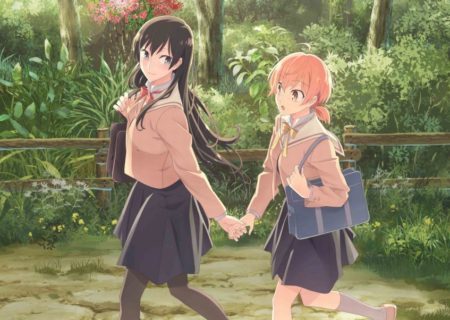
Relationships can be a bumpy ride, and this certainly isn’t a depiction of a perfect, healthy relationship- but it is an extremely interesting one, with two very conflicted characters who have in no way figured themselves out. And they’re getting better, bit by bit, and have to potential to BECOME a healthy relationship. Or maybe they’ll find other girls. Anything could happen, but I have confidence the story will handle it with grace based on what I’ve seen of it so far.
By the way, in addition to the Yuu, Touko and the adult wlw, we have another complex young wlw trying to navigate her feelings and its great seeing her journey too. She’s amazing and I want only the best for her.
(Oh, and one of these ladies is bi! Though ymmv on how well the introduction of that is handled).

On top of its sharp character writing and well-done drama, the show is also generally very pretty and wonderfully directed. The use of setting and framing and color to emphasize the character drama is top notch. Check out the gorgeous opening to get a taste of what the show can do.
I’m very glad I watched Bloom into You and I know I’ll be picking up the manga while waiting impatiently for a second season. The ending of the season feels a little unsatisfying and abrupt in light of the ongoing nature of the storyline, but that’s common in anime like this. But I really do want more. I can’t wait to see these characters continue to blossom and grow.
#bloom into you#yagate kimi ni naru#yuu koito#koito yuu#touko nanami#nanami touko#sayaka saeki#yuri#anime#anime overview#fall 2018 anime
446 notes
·
View notes
Text
Gen Freeform Exchange 2020
Hey friend!
I’m looking forward to whatever you’re going to make for me—if you want to take what was in my sign-up and run with it, go right ahead! But if you’re looking for more inspiration/ideas, keep right on reading.
If you’re not my assigned person, and are instead a generous person looking at this letter for treating purposes, I’d be happy to get treats in any medium.
General DNW
Rape/non/dub-con; non-canonical major character death; heavy angst; hurt no comfort; graphic depictions of deliberate and methodical self-harm*; graphic depictions of suicide; anything E rated; gore; heavy gender dysphoria; grimdark; complete downer endings; character bashing; incest; cringe comedy; a/b/o; mpreg; full setting AUs (canon-divergence is fine); graphic eye trauma; graphic and/or permanent hand trauma (unless the setting can provide a more-or-less fully functional prosthetic or equivalent); issuefic; unrequested identity headcanons.
*I don’t include things like, say, punching a wall in a fit of emotion under this. however, something like cutting would not be appreciated.
General Likes
– I really like plotty fics
– Secret identity and disguise shenanigans, the more layers to them and more absurdity the better.
– Crossdressing for whatever reason and gender disguises, also for whatever reason.
– Time travel and time loops are always fun, especially as a fix-it. I have a general preference for Peggy Sue style (aka, an older character getting put back in their younger body at an earlier point in the timeline) over the character’s physical body stepping back in time, but either one is good.
– A focus on family and/or friendship, especially characters realizing they’re not nearly as alone as they think they are, and just generally characters who like each other and enjoy spending time together
– Found family; families of choice
– Character studies
– Worldbuilding
All of my requests have way too many tags to relist them here, but if you’re at a loss for what to do, anything in a given request’s tags is obviously fair game; don’t feel bound by them either, since I’m definitely interested in more things than just those which appear in the tag requests.
Fandom-specific prompts and DNWs
Mother of Learning
Fandom-specific DNW: physical parental abuse within the Kazinski family, significant exaggeration of canonical emotional neglect/abuse/general family dysfunction, any implication or presence of romantic and/or sexual Zach/Zorian, either Raynie or the rest of her tribe being portrayed as Absolutely Right And Entirely Justified in all of their actions
Neoluma-Manu Iljatir & Zach Noveda
Solo: Zach Noveda
Zach Noveda & Zorian Kazinski
Fanfiction
I’d generally prefer something set at least in part after the time loop begins, but beyond that I don’t have a strong preference for where in the timeline this might be set. Maybe something from before Zorian got looped in—maybe one of the iterations where Zach and Neolu just went off across the country having fun the whole month? Zach doing whatever, possibly very early on, or maybe him freaking out a little because what the hell, time travel is supposed to be impossible, and yet—what did he do in the start? Some canon-type shenanigans with Zach and Zorian together because there aren’t lasting consequences to their actions?
Or for post-canon, I’d really like an exploration of Zach, who’s got the lived-time of a middle-aged man and the body of a teenager—how does he relate to his classmates/other people in the real world, where everyone’s growing again? Maybe something about his lawsuit against his caretaker, or just a little thing with him, Zorian, and How Do You Live Normally, Again? This Is Hard, or some such thing.
One tag I like especially—though obviously if you didn’t match on it you needn’t include it—is “Character expected to die but didn’t and now has no idea how to live anymore,” since Zach definitely didn’t fully expect he would get a chance to live through the rest of his adolescence/adulthood, and something delving into that would be really interesting!
Raynie & Raynie’s Tribe
Raynie & Kiana
Fanfiction, Podfic
I love Raynie, and I love the little glimpses we get into her character and her past in canon!
For her I was thinking maybe something after the invasion, maybe her going home again. I’d love to see a reconciliation between her and her tribe, and a settling of the issues and problems that led to her being sent away.
If I’ve got my timeline right, her brother should be old enough to have reasonable interactions with; I’d really enjoy something dealing with the tension between them, letting them reconcile and build a better sibling relationship.
Alternatively, if we’re going for pre-canon, I’d really enjoy something dealing with her initial arrival in Cyoria and befriending Kiana.
Cikan Kazinski & Kirielle Kazinski
Solo: Kirielle Kazinski
Nochka Sashal & Kirielle Kazinski
Zorian Kazinski & Kirielle Kazinski
Fanfiction
I’d really like something focusing on Kirielle here—she is, after all, the uniting factor in this set of requests.
I’ve got a few ideas for what could come of this!
-- Kirielle and her mother. For this one, I’d rather it not be anything where Cikan can be described as “winning” a confrontation—I’d much rather have it be a confrontation where it either ends neutrally or in Kiri’s favor, or a reconciliation when Kiri’s a bit older, coming to understand each other better. I’d be down for Cikan realizing that Kiri is her own person, and can forge her own way in life, if you can get a story there, but I’m not sure if there’s an in-character way to do so, given how she still relates to Daimen, a successful adult in his own right.
-- Kirielle and Nochka. They’re adorable and I’d love a further development of their friendship, especially getting to see it grow and develop over the months and years after the invasion.
-- Kirielle and Zorian. I love their dynamic! And again here I’d really enjoy seeing their relationship developing in real time, rather than a constantly looping world. I think it would be great to see either of them defending the other to their parents—and maybe Zorian ends up with custody of Kiri, there’s definitely things to explore there.
-- Kirielle. I’d be here for any sort of character study of Kiri, really, but I’m gonna prompt a few specific things anyway.
---- She grows up a little, and becomes a student mage—what’s that like for her, especially having received Zorian’s tutelage?
---- She grows up a little, and doesn’t seriously pursue magic—does she devote herself more seriously to art? Do something else? Get away from her parents, and get to just be a kid for a little longer than her siblings?
---- By some mechanism, Kirielle gets pulled into the time loop, whether with Zorian, instead of him, or in some utterly unrelated incident. What’s it like to grow older and older in life experience while your body remains stubbornly nine? How does this change the story? If you go this route I’d rather looper!Kiri not be erased in the timeline of the fic—ending the fic before it becomes an issue or letting her escape back to the real world are what I’d rather see.
---- For some reason—there’s actually a fair amount that’d have to change here, but shhh this is my ridiculous self-indulgent prompt—Kirielle is the Controller. How does she react to being in a looping world, with no one else looping she can possibly compare notes with? What does she do with her time? Why did the angels choose her? How does this impact canon—is Jornak even a problem, does the whole Sovereign Gate affair pass much as it was meant to rather than the debacle that became of it in canon?
Solo: The Ghost Serpent
Solo: Quatach-Ichl
Fanfiction, Podfic
So, these two are just… they’re old. They’re very old; QI, the younger, is still a thousand years old, and they’ve just seen so much?? I’d love some sort of exploration of the world’s history through either of their eyes.
For the Ghost Serpent, I’d be very interested in what it saw the other Branded Ones do that put it off of them so badly.
For QI, I’m interested both in the world history around him and also how he became what he is—why/how did he become a lich in the first place? Who was he before? Why did he get a divine blessing? What did he think of the gods falling silent? What was the Necromancer’s War like?
For this prompt, I’d be down for an in-universe document or legend/folktale/fairytale about them, rather than an ordinary narrative. I’d also definitely be down for something like an epic poem or story-song, if you feel so inclined.
Star Wars Rebels
Alexsandr Kallus & Garazeb “Zeb” Orrelios
Fanfiction
I’m a total sucker for the enemies-to-allies redemption arc that Kallus and Zeb have going and really, anything exploring that dynamic I’d be down for. Post-Honorable Ones is probably better—there’s a bit more to work with there—but mutual respect/grudging acknowledgement from before that point would be great too.
That being said, I would also be super down for one or both of them mentally travelling back in time and whatever ridiculous shenanigans emerge from that—honestly most of my tags can be interpreted as prompts for that, if you squint at least.
Star Wars Rebels: Servants of the Empire
Solo: Zare Leonis
Solo: Dhara Leonis
Zare Leonis & Dhara Leonis
Fanfiction
These poor kids, god. I love them and I love their siblingship and I just, I want more. A lot of the freeforms I’m asking for are geared towards the aftermath of Secret Academy, and Dhara’s recovery and her relationship with Zare throughout that. Do feel free to bring in their parents, too, though it’s by no means necessary.
Other things I’d be interested in include various types of role reversals and how that changes things—maybe it’s Zare who’s older, with a Force-sensitive little sister in Dhara, or the ages are the same and the Force sensitivity is flipped, or maybe Zare’s Force sensitive as well as Dhara, or the ages and Force sensitivity are flipped, making Zare Force sensitive and older and Dhara not force sensitive as well as being younger.
Another interesting thing would be exploring Zare readjusting to a civilian life; he’s quite conditioned into being so careful and military in his dress and his living space—does he keep that going? Let it fade? Deliberately reject it?
Solo: Lieutenant Chiron
Zare Leonis & Lieutenant Chiron
Fanfiction, Podfic
I love Chiron, he’s such an interesting character, and I am Big Sad that he doesn’t appear in any fics on ao3 as of yet. He strikes me very much as a good man who doesn’t really know most of the bad things his government is doing; he cares about Zare and he cares that there’s abuses of power and murder going on at the academy; he truly, genuinely wants to make the galaxy a better place.
I would love to see a story where he lives through the climax of Secret Academy and, however that happens, is thus forced to question his government from that, since I’m also Big Sad that he died before he had that chance; failing that it would be interesting to have a fic exploring his past and how he came to be part of the imperial war machine, I think.
For him and Zare post-canon, assuming an AU where they both survive, I’d be down to see them rebuilding the relationship they had before and regaining some sort of trust/regard for each other.
Original Works
Fandom-specific DNW: the word “queerplatonic” being used to describe relationships (writing something that you’d normally consider it is fine! I just don’t really like the term), fics that are All About Being Trans And/Or Disabled, neopronouns, nondysphoric trans characters.
Archmage & Apprentice
Failed Chosen One & New Chosen One
Girl Who Killed The Dark Lord & Her New Inherited Minions Who She Would Like To Be Less Scared
Fanfiction
I love fantasy, including space fantasy, and so many of its associated tropes: magic, destiny and fate and the subversion thereof, people being fundamentally human whilst caught up in something far beyond them…
This one’s a bit harder to prompt for, but looking through the tags I asked for should give you a decent idea for what I like; see also the general likes section above.
Thank you for creating for me!! I’m sure whatever you make will be lovely, and I’m looking forward to seeing it :D
#gen freeform exchange#genfreeformex#genfreeformex2020#exchange letters#requested: mother of learning#requested: star wars#requested: star wars rebels#requested: star wars rebels: servants of the empire#requested: original work
2 notes
·
View notes
Text
It has to be done.
It Has To Be Done
This was the excuse Dean gave to Cas. It's also just one more variant on the Absolute Worst Thing it's possible to say on Supernatural.
"I did what I had to do."
"I don't have a choice."
“It has to be done.”
In a show where Free Will is the ultimate ideal, and where giving in to Fate is not only the ultimate failure, but has consistently been framed as a metaphor for depression, for giving up, for despair and even suicide, I'm incredibly disturbed by some things I've read today about Dean's state of mind, his intention to lock himself in the Ma'lak box, and Sam's actions undertaken to stop him from this.
I’m putting this under a cut, because it actively discusses depression and suicide, so please bear that in mind before reading. The TL;DR of what’s beneath the cut is my view of how the narrative has condemned Dean’s current mindset about his only choice being to throw himself into the deepest part of the ocean to suffer eternal torment, locked in a box with the metaphorical representation of his own worst opinions of himself, is being used as a direct metaphor for depression, self-harm, and suicide. So if this is triggering, please read at your own risk.
The show has even consistently put the actors’ own Meta Narrative Terms into the characters' mouths--
Sam: You have one card today! But we'll find another tomorrow. But if you quit on us today, there won't be no tomorrow! You tell me, uh, you don't know what else to do. I don't either, Dean. Not yet. But what you're doing now, i-it's -- it's wrong! It's quitting! I mean l-look what just happened. Donatello never quit fighting. So we could help him because he never gave up. I believe in us, Dean. I believe in us. Why don't you believe in us, too?
They essentially had Sam deliver the Always Keep Fighting motto to Dean here. Because like Cas's experiences with the Empty, like Dean's experiences with the Mark of Cain and then the Darkness luring him with the promise of complete annihilation of self and the end of suffering, like Demon!Dean unable to feel either pain OR joy, THIS IS ALL A METAPHOR.
For anyone who feels that Dean is actually CORRECT and RIGHT that this is the only way, to lock himself into eternal torment at the bottom of the ocean with the metaphorical representation of his daddy issues and self-worthlessness, I humbly suggest you might wish to seek professional help. Because that's just... horrifying.
Yeah, I confess, I am a Dean girl. But in the sense that I actually care about him, and want the best for him more than I need for him to be Always Right, you know? Because... he's definitely not right here.
He’s incapable, trapped in his current mental circumstance, of seeing the light. The same way he was incapable of seeing the reality of his situation while he’d been trapped in the eternal loop inside Rocky’s Bar. The view out those blurry windows was only the darkness of the inside of his own mind, you know? From where he’s sitting, there isn’t even metaphorically a door. Trapped inside the Ma’lak box already even in his own nightmares. That’s not a mindset from which one can find the way out on their own.
That’s depression.
I also do not see anything Sam has done in the last two episodes as abusive or in any way infringing on Dean's agency. Because people who are showing all the symptoms of suicidal depression don't actually HAVE agency. And I would've been DISGUSTED with Sam if he'd sat back and just accepted Dean's choices and actions over the last two episodes.
Everything Dean has done in 14.11 and 14.12 (and even trapped inside his own mind in 14.10, where Sam and Cas had to navigate a space that was identical to The Empty, and served the same function metaphorically as Dean having been "locked away" into this tiny box in an endless loop unable to truly find happiness and only surviving disconnected from reality in every way) has functioned as a metaphor for depression, hopelessness and major warning signs that people who are seriously contemplating suicide exhibit. Sam's reactions bear this out, and everything he does follows the playbook of someone who truly cares about Dean literally helping talk Dean down off the ledge.
Sam saw into Dean's head in very literal ways in 14.10. He heard Michael-- the embodiment of the worst thoughts trapped in Dean's own head-- attempting to convince Dean to give up because they were all doomed by his monsters coming to kill them all anyway. And that NEARLY happened, yes! They were tricked into bringing a monster into the bunker, who let in a flood of other monsters to attack the unprepared hunters. In a horrifying turn, Jack burned up a piece of his own soul to save them all, which allowed Sam, Cas, and Dean working together to lock Michael up, albeit in a temporary fashion.
But Dean is absolutely convinced that the only way to stop Michael from escaping again is to lock himself up in a magical box and fling himself to the bottom of the ocean. At this point, my brain refuses to let me go on unless I add the line, "And I would've gotten away with it too, if it weren't for you meddling kids!"
The plan Billie gave Dean isn't some sort of Safety Measure in case of Last Resort. It was portrayed as the easiest way out. It was the whisper of the void stroking Dean's brow and telling him he can lay down his burden and allow himself to quit fighting, to quit trying, to give up on everything he's ever stood for.
It's HORRIFYING.
It’s horrifying in the same way Sam nearly giving in to Death in 9.01 was. Horrifying in the same way Dean going all kamikaze for a large part of early s3 was, knowing he was doomed to die he was reckless with his own safety.
Sam immediately started researching on ways to save Dean and defeat Michael, but Dean refused to even engage with that rational course of action. He'd already succumbed to the seduction of annihilation. He flat-out LIED to Sam about why he was leaving-- I mean yes, he did wanna visit Mary, and the side-trip to see Donna was nice, but Donna did call him out on his motives for seeing her. So did Mary, who was suspicious of Dean from the outset the way Donna had been. But it was that stupid awkward hug Dean gave Sam that he CORRECTLY INTERPRETED as a sort of farewell. It was a WARNING SIGN that Dean was hiding something incredibly dark and selfish, and self-destructive.
What Sam did as a result was ENTIRELY UNDERSTANDABLE. He didn't try to confront Dean directly. He treated him like a man on a ledge. He began setting up safety nets, alerting the people with Dean to his fragile state, even urging Cas not to confront Dean directly yet despite telling him-- because they are WORRIED about Dean-- what Dean's plans were.
This is what family who loves you DO when their loved one shows all the signs of severe suicidal depression.
This is what Cas did for Dean in 12.09, where Dean had textually been suffering torment “worse than Hell” in that prison, to the point where he’d dealt his own life away with Billie to help him and Sam escape. Cas took matters into his own hands, killing Billie to spare Dean from his own stupid choice. Because it was a stupid choice.
You don't just... go along with the depressed person or validate their suicidal ideation, you know? What madness is this that I've actually read with my own two eyes that Sam should've just... actually helped Dean effectively and metaphorically commit suicide? On what planet has this ever been something the show has said would be okay?
Everything Sam has done from that point forward-- from tentatively agreeing to stand by Dean at the end of 14.11 right through punching him in the damn face at the end of 14.12-- has been a textbook approach to supporting someone suffering through a major depressive episode.
His acknowledgement and surface level agreement with Dean in 14.11 was literally his foot in the door. If Sam had attempted to defy Dean in that moment, Dean would've packed up his box and left, and his final memory of Sam would be this feeling of betrayal. Sam needed Dean to accept his presence in order for him to have any hope of getting through to Dean.
I know from personal experience that depression lies. The hopelessness isn't real, but there's nothing more unhelpful in that state than the people around you just agreeing with you as if it is. It's a difficult balance to strike, though, between sympathizing with the depressed person and gently beginning to peel back the curtains they've shrouded themselves with, and revealing the hope and light outside. Just ripping it all down is just as horrific and untenable as letting the person suffocate inside their own hopelessness. So Sam takes the seat beside Dean and begins slowly chipping away at the literal tomb he's built for himself.
Sam tries logic, while Dean faces the horror of what he's condemned himself to in his nightmare-- clawing up the wall of the motel room enclosed in chains (the motif on the wallpaper formed a cage of chains around Dean, while Sam was framed in the doorway of light. Dean tore up his hands clawing at the wall in his subconscious drive to escape the fate he’d built for himself, and yet he keeps his back to that lightened doorway which is the obvious route to escape. He can’t even acknowledge it yet because he’s still bound in those wallpaper chains.
Sam tells him it's likely that Dean wouldn't die, that his suffering would never end, and that what he's suggesting isn't an escape from that torment that he's actually hoping to find. And Dean's mind seems to see this as fact already, demonstrated as exactly that in his own nightmare just moments before-- he's alive in that box that's already developed a crack where the water is drip drip dripping in. He knows the box cannot hold, and that he will not die as a result.
He was terrified of "drowning" inside his own mind when Michael took him over before, yet he thinks the rational solution now is to drown himself literally and in reality, for all time. I mean... this is not the thinking of someone who is behaving rationally. He's chained to his fear, and that fear is dictating his actions now.
Should his loved ones simply accept that Dean is right and encourage him to self-destruct? Especially when we've been discussing all season how Dean's possession by Michael, his experiences drowning, his metaphorically locking Michael away, and his earlier drive to kill Michael before he could destroy the universe ALL as metaphors for Dean's own self-worth, his Father Issues, his guilt, his suppression of his whole self?
Dean’s been sharing reminiscences of childhood for a while now-- his story about Winchester Surprise with Mary, his confession to Sam that John had often sent him away and his fear ever since that Sam believed Dean had just abandoned him during those times are clearly the sorts of Dark Thoughts that are weighing on him now. Knowing just a little of the inciting factors we’ll see play out in 14.13 are giving me serious hope that Dean will find the catharsis he’s been unable to get regarding some of his long-standing, incredibly complicated feelings about his father. The fact that Dean will go in thinking his Deepest Desire (a phrase he’s used before to describe his temptation to self-annihilation, in 11.13) is to rid himself of Michael, but apparently manifests John alive instead is extremely telling since Michael has been a direct John parallel all season long.
But back to all the other metaphors and parallels that Dean’s possession by Michael has been used for all season long. How does all of that careful construction of mirrors collapse just because Sam punched Dean in the face? Suddenly none of that stuff matters because on a surface level, Sam Did A Mean Thing. That must be ABUSE! TERRIBLE! Because honestly that sounds just as nihilist as buying into Michael's deluded lies, which preyed on Dean's fears to sustain his belief in them.
Yeah, Sam realized he'd reached the end of his rope in letting Dean continue walking down the self-destructive path. Throughout the episode that Ma'lak box just dragged along behind them, always visible in Dean’s rear view mirror, silently reminding us of what would inevitably await Dean if he couldn't find a way off that path. It functioned as the specter of death, the shadow, boxed up so you couldn't see the Ma'lak box itself, but you just know it's right there under that thin surface.
Sam and Cas both tried patience. They both explored other metaphorical alternatives to active suicide. The situation with Tony Alvarez turned out terribly, but it was just one consequence of their previous mistake in letting soulless Donatello read the demon tablet. If they hadn't done that, then Tony would've fully awakened as a prophet instead of being driven to madness by the half-awakening he was doomed with because of the state they left Donatello in. And sure, they couldn't have foreseen that, but in the end the solution wasn't just to kill Donatello, but to find a way to save him.
Dean had been CONVINCED that "letting him go" would be the solution, and he acknowledged that parallel to himself in text.
Castiel: The natural order's been upset. Perhaps Donatello's state has created a prophet who's not only premature... but malformed.
Sam: Okay. But if Tony was wired wrong because of Donatello, then the next prophet will be wired wrong, as well, and then the next, and the next and the -- the next and... How do we end this?
Dean: You know how.
But from his position, Donatello was unable to save himself, despite his mind even unconsciously trying to do so. Just like Dean alone can't see a way out of his situation, which is why he NEEDS the help and support of his loved ones. Team Free Will, they're just better together.
This is the narrative the show has been building on in one way or another since the start. When they go their separate ways, they doom themselves. When they stick together, they at least have a fighting chance.
And after Cas provided the help to heal Donatello and break the demon tablet's hold over him, performing what they'd all previously believed impossible, Dean couldn't face that his own metaphor for what he wanted to do himself had completely fallen apart. He was already shaky on wanting to go into that box. He'd essentially spent the entire episode goading Sam into talking him out of it.
He doesn't WANT to go through that eternal torment, but he legitimately is unable to see another way out. Like Donatello's muttering what amounts to a cry for help through the next prophet, Dean was doing the same by harping on the "it's the end of the line!" nonsense that Sam repeatedly had to ask him to stop.
He was also goading Cas with the "if you were my friend" garbage, challenging him to do something to stop him. Cas turned it around in the most painful way possible, laying out on the table the ONE THING Dean had said he was unable to do-- say goodbye.
Dean’s harping on the whole “last hunt, end of the road” stuff was the equivalent of a depressed person talking about themselves negatively as if there was something “honest” about romanticizing their depression. It’s fatalistic, and does nothing to help recover. It’s wallowing.
In episode, this was directly contrasted with Nick, who insisted his emotional pain had been the result of his wife never getting justice for what happened to her, but when faced with his wife actively holding out her hand and telling him “this is the way to salvation,” he rejected it, because all he wants now is to drown himself in Lucifer’s false salvation. He could’ve gone into the light, and let go, but he refused. Sam and Cas spent the entire episode trying to break through to Dean and bring him a spark of hope, and he’d been refusing and refusing. Nick was never really sorry. He was only playing sorry. Just like Dean until his final confrontation with Sam, where he finally called Dean out with that exact turn of phrase.
Dean wanted to run away, alone, and off himself. Cas was pressing him into dealing with it, demanding Dean acknowledge what he was really asking for. I think if there hadn't been an attack of Moosus Interruptus there, Dean would've cracked right there in the hallway, but of course they had to save Donatello first, making the metaphor complete.
That left the final confrontation to Sam.
Dean: Well, I would call this a win. Kind of nice. We're going out on a high.
Sam: 'Going out' being the operative phrase.
Dean: Sorry.
Sam: 'Sorry.' How sorry are you? Sorry that you fight to keep Donatello alive, but when it comes to you, you just throw in the towel? Or are you sorry that, after all these years, our entire lives, z-after I've looked up to you, after I've learned from you. I-I-I've copied you, I followed you to Hell and back, are you sorry that all of that -- it -- it -- it means nothing now?
Dean: Who's saying that?
Sam: You are, when you tell me I have to kill you. When you're telling me I have to throw away everything we stand for, throw away faith, throw away family. We're the guys that save the world. We don't just check out of it!
Dean: Sam, I have tried everything. Everything! I got one card left to play, and I have to play it.
Sam: You have one card today! But we'll find another tomorrow. But if you quit on us today, there won't be no tomorrow! You tell me, uh, you don't know what else to do. I don't either, Dean. Not yet. But what you're doing now, i-it's -- it's wrong! It's quitting! I mean l-look what just happened. Donatello never quit fighting. So we could help him because he never gave up. I believe in us, Dean. I believe in us. Why don't you believe in us, too?
Dean: Okay, Sam. Let's go home.
When the show is actively putting Always Keep Fighting language into Sam's mouth, is there really another way to interpret any of this than as a direct depression metaphor? Dean yells that he has tried everything. But... he’s literally tried NOTHING. He hasn’t tried one single other thing. He hasn’t even cracked another book or done a jot of research beyond the one Billie specifically put in his hands. Dean is just as trapped as Donatello was before Cas intervened to heal him. And he’s so trapped that he actually BELIEVES that he’s exhausted all his options. Because he can’t even begin to SEE any other options with his back turned toward the door focusing only on the wall he can’t seem to scratch his way through.
Suggesting that Sam was violating Dean’s agency in this circumstance is akin to suggesting that Sam violated Dean’s agency in forcing the demon cure on him, or akin to suggesting that Dean violated Sam’s agency when he shoved Sam’s soul back inside him. And yet... Sam and Dean both expressed gratitude after the fact, acknowledging that they couldn’t see just how badly they each needed help while in their respective compromised states. And that’s exactly the same framing they’ve given us to interpret Dean’s current mental status.
Sam had reached the end of his rope, and out of frustration and his own sense of failure to appeal to the part of Dean that should want to survive, he broke down himself. It hurt to watch, both for Sam’s sake because of the frustration of desperately trying to save someone intent on destroying themselves, as well as Dean’s sake because OUCH to have to face his self destructive impulse head-on like that... Sam’s punch hug forced that confrontation in ways none of their words had been able to.
It was the equivalent of Dean brushing the board game off the table in 7.21 and yelling at Cas that he wasn’t sorry, but only playing sorry... It was the sort of shock and shakeup Dean needed. He needed to see how badly his current state was affecting the people he loved, and the people he was deludedly trying to protect through what he felt was his own self-sacrifice. He needed to see first-hand just how wrong an assumption it was that they’d be fine if he went through with this effective metaphorical suicide.
and then when Cas returned, Dean confirmed that he'll let them help him, but he's holding that box in reserve.
Dean: Maybe Billie's wrong. Maybe. But I do believe in us. I believe in all of us. And I'll keep believing until I can't. Until there is absolutely no other way. But when that day comes -- if that day comes... Sam, you have to take it for what it is -- the end. And you have to promise me that you'll do then what you can't do now, and that's let me go. And put me in that box. You, too.
“Maybe Billie’s wrong,” is the metaphorical equivalent of “Maybe this depression is lying to me...”
He's still struggling with this big depression metaphor, but he has stepped off the ledge. He's acknowledged that there might be another way, even if he doesn’t really have much hope that he’ll be able to find it. But he’s accepted Sam and Cas’s help to guide him there.
And it's only one small step in the right direction, but it is a step. I'm betting it's a step big enough for at least a few of those books on Billie's shelves to have begun rewriting themselves. Because when has this show ever taught us to accept that giving in to Fate was the Good and Correct choice?
#spn 14.12#oh DEAN#suicide mention#spn 14.10#spn 14.11#spn 14.13#spn 7.21#spn 9.01#spn 11.13#spn 12.09
131 notes
·
View notes
Text
Supergirl season two full review
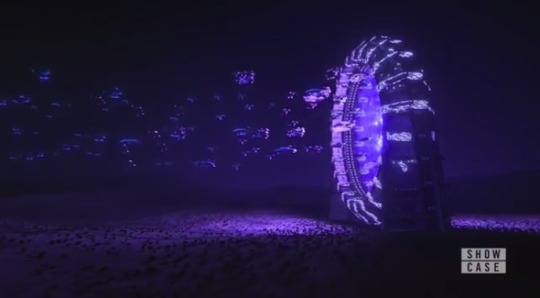
How many episodes pass the Bechdel test?
100% (twenty-two of twenty-two).
What is the average percentage per episode of female characters with names and lines?
49.93%
How many episodes have a cast that is at least 40% female?
Nineteen.
How many episodes have a cast that is less than 20% female?
Zero.
How many female characters (with names and lines) are there?
Twenty-five. Thirteen who appear in more than one episode, five who appear in at least half the episodes, and two who appear in every episode.
How many male characters (with names and lines) are there?
Thirty-six. Thirteen who appear in more than one episode, four who appear in at least half the episodes, and one who appears in every episode.
Positive Content Status:
Though the numbers turned out higher than last season by virtue of some stellar narratives in the early part of the season, in reality this was a disappointing return to the show, by-and-large shallower and overly dependent on life-defining concepts of unhealthy romance (average rating of 3.09).
General Season Quality:
Starts out fantastically well, but loses steam around mid season, and turns pretty damn sour by season’s end. A shocking waste of the potential promised by the first season; I’ve practically got whiplash from how severely this turned.
MORE INFO (and potential spoilers) under the cut:
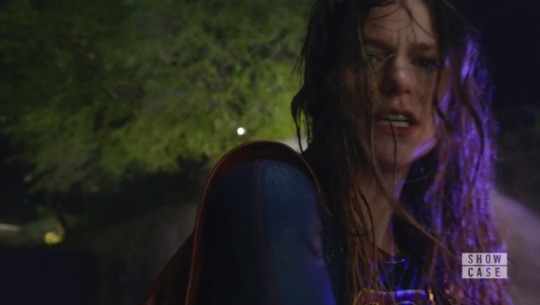
Well, this was a clusterfuck. Let’s see if we can break it down into three manageable categories: world building, politics, and relationships.
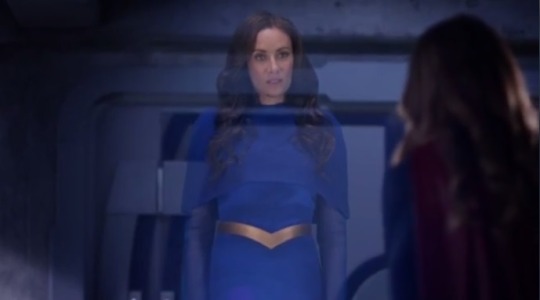
The primary victim of this season’s bad storytelling is the alien world of Daxom, and the shoddy world-building there leaks out all over the rest of the narrative. We’re told initially that Daxom is some horrible party planet whose politics were at odds with truth, justice, and the Kryptonian way - we’re told this within a clear framework of confronting ingrained prejudices (something I applauded at the time, you may recall), a context which implies that there is complexity and nuance to Daxom that is going unrecognised, and which we might reasonably expect to explore as the season progresses. It doesn’t happen. We’re told that the people of Daxom are kept drunk so that they won’t question their oppression; we’re told that they were all too drugged up to ‘feel anything’; we’re told that they maintained a sex-drenched hedonistic society headed by an evil, war-mongering, slave-owning royal family (the slavery thing really makes it seem like Kara buried the lede by complaining about a ‘party planet’, too: honestly who cares if they’re partying? They have slavery. SLAVERY). Our hero Supergirl even tells us that the Daxomite prince was ‘the worst of the lot’, though she conveniently neglects to detail how he was the worst, which becomes conspicuous once it is revealed that her new boyfriend Mon-El is that prince. Everything we ever learn about Daxom is cartoonishly negative; it’s also somewhat at odds with itself. Were the Daxomites viciously oppressed and constantly partying? While it is technically possible to have both be true, the entire planet is treated as such a homogenous whole it’s hard to know who was suffering, who was livin’ it up, and who was doing both. Are the rich people being kept drunk and drugged so that they won’t object to their own superiority? Are the poor people provided the freedom and resources to party hard on a constant basis to prevent them from rioting over their non-specified hardships? The details are so vague we can’t even draw clear conclusions about who is responsible for this situation, because if everyone is drunk, drugged, or otherwise unable to gain perspective on their circumstances, then can they really be blamed for them? Daxom’s entire population is tarred with the same broad brush, a collection of cliches masquerading as world-building but really only serving to form a blurry image of a dysfunctional and inherently bad society. And with Daxom’s bevy of stereotypes standing unquestioned and therefore unclear, we segue easily into...
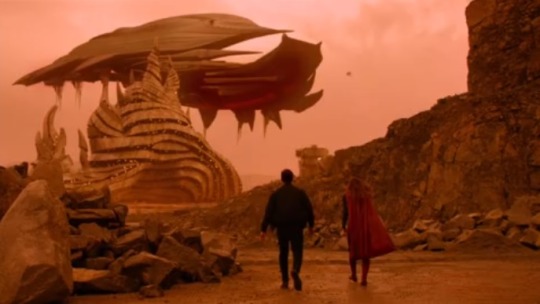
Politics. Early on when I applauded the show’s transparency about stating its political convictions, I had no idea how far they intended to take it, and how blisteringly uncool it would be. Where, at that early stage, the politics the show was declaring was all about equal rights and therefore undeniably positive, as the Daxom issue grew the political mess became far less inclusive. Despite being confronted by the reality of Krypton’s flaws back in the first season as well as in this one, the positioning of Daxom as an uncomplicated evil serves to backtrack on Supergirl’s personal growth in recognising that she is not immune from bigotry herself, instead validating her hatred. Ironically, they get the opportunity to examine the same confrontation for Mon-El later in the season when meeting with his parents forces him to acknowledge how far his personal beliefs have strayed from his upbringing, and yet they waste that chance as well, because duh, Daxom is bad. Exploring what was wrong with Daxom wasn’t about furthering that statement on equal rights, not least because exploration of Daxom’s flaws didn’t really happen at all, we were just handed the party line and told to go with the idea that this whole planet was garbage. And then on top of that, the show went and made the political division of Krypton and Daxom into a stand-in for real life American Democrats vs Republicans, with Rhea echoing Republican catchphrases while the much-championed equality-advocate and literal alien President of the United States is explicitly identified as a Democrat! Supergirl’s writers thus make a statement not about political policy or basic rights, but about political affiliation in the real world, and there’s nothing positive about using the cartoonish villainy of Daxom as a vehicle for attacking Republicans. This sends the message that Supergirl is not a show for Republican audience members, and that divisiveness is just not useful. Instead of using their show as a platform to promote positive and healthy ideas, it is used as a weapon to shame and (again with the irony) alienate a potential half of its viewership, and in the current political climate, that’s irresponsible story telling, not to mention anathema to Supergirl’s first-season theme of unity across barriers.
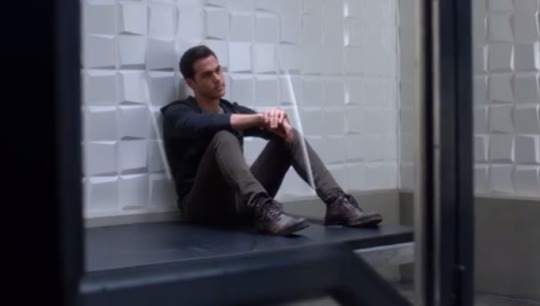
So, we have a world that is just broad-strokes Bad News, an ill-advised not-metaphor for real-world political divisions, and a bunch of missed opportunities to explore the nature of bigotry. That last one is a bigger problem than it may initially appear, too, as noted in the episode posts: if the writers were trying to tell this story in a serious way, they’d have really invested in deprogramming Mon-El. As eager as they were to make Daxom ‘evil’, they didn’t want to also make Mon-El ‘evil’ as Kara said he was when she spoke unknowingly of Daxom’s prince, and so Mon-El becomes a victim of the vague world-building of Daxom, and creates a feedback loop which in turn makes Daxom’s world-building more vague by virtue of its politics not being clearly reflected in the unfiltered behaviour of its favourite son. The show wants Mon-El to be blamed for being born the prince of Daxom, but it also doesn’t want that - it wants the cheap drama of Kara expressing her own bigotry, but it doesn’t want Mon-El to actually be that bad, but it doesn’t want to admit that Kara is prejudiced, but it doesn’t want her opinion to be wholly justified in this one instance, just every other one, etc, etc. The show is too afraid to demonstrate Supergirl having ugly beliefs of her own to question, nor does it really want to do its due diligence on having Mon-El process the complex reality of having everything he was raised to believe called into question and/or summarily rejected by his new society. In the process, the season forgets to have any kind of moral centre, losing itself in that all-encompassing disavowal of Republican politics but failing to be specific even then, and a superhero story without a moral centre is...kinda pointless. The resulting mess of politics and lazy short-hand, again, cripples Mon-El’s functionality as a character as he ends up tacked together out of disparate pieces, never really Daxom enough for Daxom, his playboy issues mostly pared down into base-level comic relief, and a grotesque romantic entanglement thrown in over the top to make his convoluted non-personality worse.
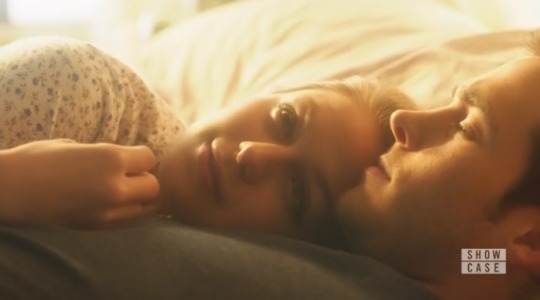
Which brings us to: relationships. Perhaps surprisingly, I don’t actually think Mon-El himself is the worst part of this season - as noted above, I see him as a symptom of much bigger issues - but his relationship with Kara is a huge problem. It plays pretty much every toxic bullshit trope I would have expected this show - especially after the precedent of awareness set last season - to avoid. The fact that Mon-El’s fuckboy behaviour is the only real evidence of that Daxomite heritage the show is refusing to properly unpack means it comes off not as a learning curve for him so much as an uncharacteristic weak point for Kara, that she would tolerate being screwed around by the thoughtlessness of this guy. That the show repeats this lazy drama literally one episode after another, having Mon-El mistreat or disappoint Kara at the start but make it up to her by the end, is further damaging as it shows Kara suffering a cycle of poor behaviour without any indication of why she keeps coming back to it, which again makes her appear weak-willed in total contradiction of her usual Supergirl persona, feeding an image of her as so love-struck as to be victimised by it despite any such ‘love’ being entirely unearned by the arcs of the narrative. That this is not only a massive unhealthy cliche but also one which is being served up without commentary as though the writers legitimately think it’s unproblematic romance makes it all the more shocking. Kara’s personality is overridden by her romance with Mon-El, and the rest of her relationships - most notably with Alex - are sidelined in favour of it; as the season wears on Kara rarely manages stories of her own that don’t revolve around the spontaneous and awkwardly forced romance with Mon-El. Why does she love him? Because the script says so. She loves him despite him being a Daxomite, but we’re not gonna explore that because it’s in admitting-that-good-guys-have-flaws territory. Giving the romance nuance or believability or unpredictability would require better characterisation of Mon-El and therefore Daxom and therefore, Kara’s prejudices that we’re supposed to pretend aren’t really a problem because Daxom is Evil. If Kara could have spent the season navigating the pains of bigotry with Mon-El, that would have been interesting and thought-provoking storytelling, and if they really insisted on making a romance there at least they woulda been treading some less generic ground.
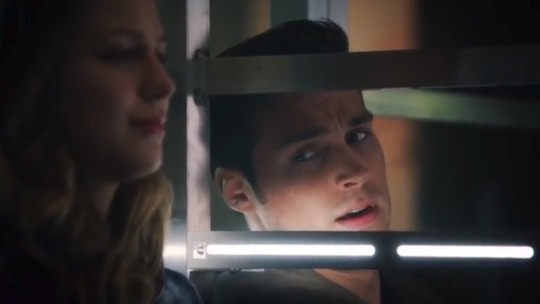
Then again, they were already treading less generic ground when Kara was oh-so-briefly with James Olsen, before some fuckwit decided that it was too racially subversive to tell that story, and James ended up shafted with a promising but under-developed personal story and little to no contact with the rest of the characters all season long, making it almost weird when he occasionally graced us with an appearance. Alex at least fared better in the relationship that drew her away from Kara the majority of the time, scoring one of the only good subplots of the season in the form of her coming-out process, though I must admit I dislike Maggie and find her a flat, poorly-drawn character, as if the writers went ‘she’s a tough lesbian cop! That’s three words! It’s plenty of personality!’ and just kinda left it at that, and that taints the ongoing story of Alex’s personal life. The only passable romance in this season of Unnecessary Romances For Everyone Not Called James was J’onn and M’gann, and that possibly only worked because it was understated and featured but briefly; Winn’s relationship with Lyra, on the other hand, was just another cliche mess as irritating as it was dull, and pointless to boot, like the writers couldn’t figure how to write Winn a personal plot without it being a romance. Nice work, guys.
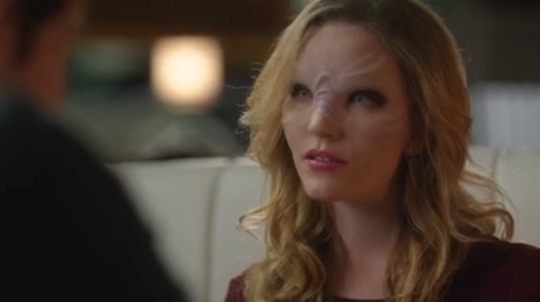
There is so much more that we could complain about this season - don’t even get me started on the total misfire which was the CADMUS plot - and so few things to appreciate - Lena Luthor deserves a nod, queer rep is always a win, Martian stuff is great, Clark Kent is delightful - but it’s probably time to let this bad batch go. If we’re lucky, the folks behind Supergirl learned about a trillion lessons about how to do storytelling and will get back to actually trying, come season three. If not, I guess y’all can look forward to me bitching about it. A lot. They burned my trust in this show worse this season than I would have thought possible, and I’m not convinced they can earn it back. We’ll see.
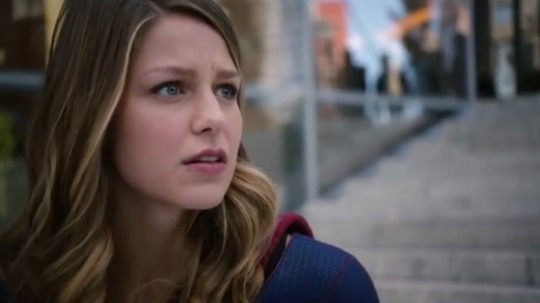
72 notes
·
View notes
Text
Lucifer Season 5 Episode 9 Review: Family Dinner
https://ift.tt/3yHo0NY
This Lucifer review contains spoilers.
Lucifer Season 5 Episode 9
“All I wanted was a nice family dinner.”
After a nine month Covid-19 related hiatus, Lucifer returns to Netflix for the second half of its fifth season, and the family dynamic changes dramatically with the introduction of Dear Old Dad to the mix. Throughout the course of its run, the series’ writers have masterfully woven a crime-of-the-week drama into the fabric of the emotional turmoil the core characters, both celestial and mortal, experience in their everyday lives. “Family Dinner,” takes this narrative technique and sets into motion a series of events that promises to examine these intimate relationships that ultimately speak to the higher themes of love, devotion, and sacrifice.
With any other show, God’s corporeal appearance on Earth would be the central focus of the episode, and while His role certainly allows His sons to air their individual paternal grievances, it’s difficult to ignore the eventual impact this family gathering has on Lucifer’s relationship with Chloe. Needless to say, theirs has been a romantic rollercoaster ride, and despite his difficulty telling her that he loves her, their connection, at first, appears to be moving in the right direction. She tells Dan that she and Lucifer have “hit a snag,” but Lucifer’s brutally honest admission at the episode’s end can’t help but alter their ability to work together as partners moving forward and potentially end any hope they have of finding happiness as a couple.
However, it’s Lucifer’s capacity for self-destruction that dominates this poignant scene because it’s clear he completely misreads his Father’s signals during the extended dinner scene that occupies a good chunk of the story and applies it to his relationship with Chloe. Lucifer confronts his Father about the emotional tortures each of His children has weathered, but it’s obvious he feels he’s been dealt the worst hand. Nevertheless, the flash point occurs when Lucifer forces God to acknowledge the fundamental question with which all children wrestle at one time or another. “Dad, did you love us?” Of course, we can debate the wisdom of God’s answer to his son, but it’s Lucifer’s clumsy deduction that ultimately sets the stage for yet another misguided attempt to spare Chloe from what he perceives to be a situation rife with pain.
Read more
TV
Lucifer Season 5 Episode 8 Review: Spoiler Alert
By Dave Vitagliano
TV
Lucifer: God Takes Charge As Dennis Haysbert Joins Season 5
By Dave Vitagliano
Though Lucifer consistently forces us to question aspects of our own lives and relationships, “Family Dinner” goes down that often dark path so many families choose to avoid at all costs. Despite Lucifer’s condescending remarks about his Father’s seeming lack of omniscience, God’s refusal to succumb to these taunts opens the scene for each to lay bare his greatest concern. While it’s Lucifer that openly challenges his Father about His decision to withhold a confirmation of their father’s love, Amenadiel and Michael grapple with their own inner demons. Understandably, Amenadiel fears the pain his mortal son will face as he grows up, and the beautifully executed exchange he has with his Father forces him to accept Charlie’s fate notwithstanding his touching offer to surrender his own immortality.
All of which leads to Lucifer’s announcement to Chloe that he’ll never be able to tell her he loves her. As it typically does, the murder investigation brilliantly parallels the personal narrative taking place within Lucifer’s sphere, and despite his recognition that Chris Peterson died protecting his father’s mini-golf kingdom, our bedeviled protagonist can’t see the forest for the trees. It’s true, God declines to explicitly tell his children he loves them, but the subtext should be obvious to anyone who’s able to truly listen above the self-loathing din. But even if Lucifer believes his Father incapable of love, it’s difficult to accept that he can’t see the personal growth he’s exhibited since he’s been in the company of Chloe and the others. Everyone within Team Lucifer understands that he clearly loves the detective; whether he’ll ever accept that fact remains to be seen.
While the episodic components don’t all scream doom and gloom, Ella struggles in the aftermath of her relationship with a serial killer, and Dan begins to accept that he’s the latest mortal to be read into the reality of the Devil on Earth. We know Miss Lopez will move on from her horrific experience, but things may not go as smoothly once she realizes she’s the last remaining member of the team to learn of the existence of celestials on Earth.
It’s true the family dinner casts a bit of a pall over the proceedings, but we shouldn’t overlook the beautiful moments that appear throughout the episode. How about we begin with God’s choice of a beige cardigan and the fact that Dennis Haysbert is about as perfect a choice as there is to play the Supreme Being. His touching exchanges with Linda and His propensity for cradling baby Charlie leave no doubt that God’s children are wrong about His feelings for them. Even though Linda’s been read into the celestial throng’s existence longer than anyone else, God’s appearance in her home throws her for a delightfully executed loop nonetheless. Still, He makes a point of praising her whenever the situation arises. His insistence that she’s part of the family leads into her uncomfortable attempt at saying grace, and it’s His acknowledgement that her thankfulness for the mundane that reinforces the fact that Lucifer simply doesn’t get it. It really is a wonderful moment.
Still, the use of the celestial family as a metaphor for the struggles all families eventually encounter drives home one of the central themes explored in Lucifer. Love comes through actions, not words, yet for some reason, Lucifer can’t seem to accept that about himself. Needless to say, he’s quick to accuse God of being a poor father even though his own inability to tell Chloe how he truly feels about her essentially functions in the same manner. Of course, God loves his children, but with great power comes great responsibility. And while Amenadiel generally lives up to his Father’s standards, the same can’t always be said of the others. Perhaps it’s time for the celestials to bear in mind an axiom mere mortals have acknowledged for millenia – God works in mysterious ways.
cnx.cmd.push(function() { cnx({ playerId: "106e33c0-3911-473c-b599-b1426db57530", }).render("0270c398a82f44f49c23c16122516796"); });
It’s difficult to explain the elegance with which Lucifer continues to explore not only the duality of human existence but the crises of faith both mortals and celestials continually face. With Haysbert’s introduction as the family Patriarch, “Family Dinner” takes the series to new heights, not an easy feat for a show that already enjoys a significant amount of critical acclaim. But do we really believe God plans to sleep on a futon in his son’s home?
Lucifer season 5 is available to stream on Netflix now.
The post Lucifer Season 5 Episode 9 Review: Family Dinner appeared first on Den of Geek.
from Den of Geek https://ift.tt/3uvbJsK
0 notes